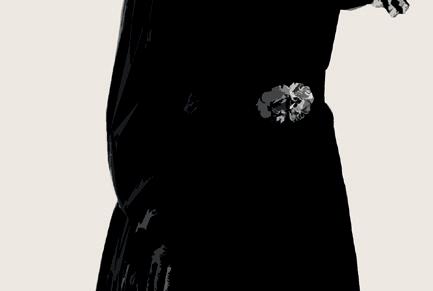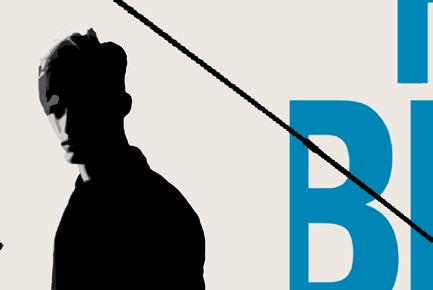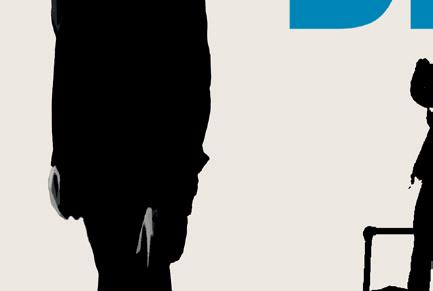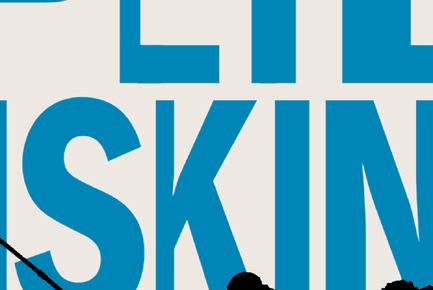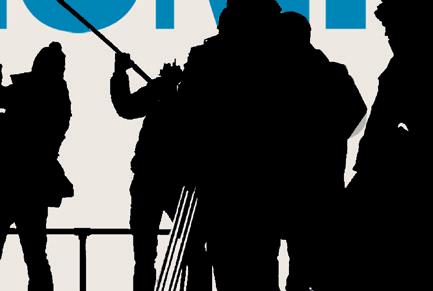INTRODUCTION: BROADCAST BLUES
How the cable minnows swam circles around the network sharks, until the streaming whales swallowed them all.
How the cable minnows swam circles around the network sharks, until the streaming whales swallowed them all.
“ You couldn’t kill a dog,” recalls Sopranos writer Robin Green, reflecting on her years laboring in the vineyards of network television. “The character loses the sympathy of the audience.” Remember the outcry that greeted the scene in The Godfather where the horse’s head ends up in the bed of Jack Woltz, never mind the scores of humans garroted, shot, stabbed, or otherwise consigned to sleep with the fi shes.
“ You couldn’t kill a dog,” recalls Sopranos writer Robin Green, reflecting on her years laboring in the vineyards of network television. “The character loses the sympathy of the audience.” Remember the outcry that greeted the scene in The Godfather where the horse’s head ends up in the bed of Jack Woltz, never mind the scores of humans garroted, shot, stabbed, or otherwise consigned to sleep with the fi shes.
Cruelty to animals was just one of the many no-no’s viewers would never see on TV during the high tide of the broadcast era. Nor would they see extreme violence, nudity, or sex nor hear the infamous seven dirty words—“shit,” “piss,” fuck,” etc. Should two characters, invariably straight, exchange more than a peck on the cheek, the camera would discreetly pan away to, say, burning logs in a fi replace. The mantra was “See no evil, hear no evil, speak no evil.” The result was that TV had become a “vast wasteland,” as John F. Kennedy’s FCC chairman Newton Minow memorably put it in 1961. Why? Because of the sponsors who paid the bills, aided and abetted by the FCC.
Cruelty to animals was just one of the many no-no’s viewers would never see on TV during the high tide of the broadcast era. Nor would they see extreme violence, nudity, or sex nor hear the infamous seven dirty words—“shit,” “piss,” fuck,” etc. Should two characters, invariably straight, exchange more than a peck on the cheek, the camera would discreetly pan away to, say, burning logs in a fi replace. The mantra was “See no evil, hear no evil, speak no evil.” The result was that TV had become a “vast wasteland,” as John F. Kennedy’s FCC chairman Newton Minow memorably put it in 1961. Why? Because of the sponsors who paid the bills, aided and abetted by the FCC.
Copying the sponsor-based business model used by radio in the 1920s and ’30s, their shows, analogous to the four quadrant blockbusters produced by the movie studios, were meant for everyone. The programming may have been free, but the not-so-hidden cost was high: terminal blandness. Fiercely protective of their brands, jittery advertisers whose primary goal was to sell Camels, Cheerios,
Copying the sponsor-based business model used by radio in the 1920s and ’30s, their shows, analogous to the four quadrant blockbusters produced by the movie studios, were meant for everyone. The programming may have been free, but the not-so-hidden cost was high: terminal blandness. Fiercely protective of their brands, jittery advertisers whose primary goal was to sell Camels, Cheerios,
and Chevrolets wanted TV’s doctors and lawyers happily married, not fighting in divorce court. They wanted their cops and cowboys delivering the bad guys to justice, not beating, framing, or otherwise abusing them.
and Chevrolets wanted TV’s doctors and lawyers happily married, not fighting in divorce court. They wanted their cops and cowboys delivering the bad guys to justice, not beating, framing, or otherwise abusing them.
Each network had a department called Broadcast Standards and Practices that made Hollywood’s old Production Code read like Lady Chatterley’s Lover. It policed its shows, even preventing married couples from sleeping together in the same bed. Belly buttons were hidden, and Elvis Presley was never televised below the waist on The Ed Sullivan Show. The plainer the vanilla, the richer the ice cream, aka the profits. The networks competed with one another in a race to the bottom. The watchword that defi ned “the idiot box” was “lowest-common-denominator programming.”
Each network had a department called Broadcast Standards and Practices that made Hollywood’s old Production Code read like Lady Chatterley’s Lover. It policed its shows, even preventing married couples from sleeping together in the same bed. Belly buttons were hidden, and Elvis Presley was never televised below the waist on The Ed Sullivan Show. The plainer the vanilla, the richer the ice cream, aka the profits. The networks competed with one another in a race to the bottom. The watchword that defi ned “the idiot box” was “lowest-common-denominator programming.”
Thus it was that the first golden age of live TV became a measureless tract of hard, cracked soil, inhospitable to intelligent life, populated solely by reruns of old movies, dumb and occasionally fixed quiz shows, as well as placid, family-friendly sitcoms with canned laugh tracks that, like flat stones skipping across the surface of a pond, rarely touched upon the issues that roiled the depths beneath it.
Thus it was that the first golden age of live TV became a measureless tract of hard, cracked soil, inhospitable to intelligent life, populated solely by reruns of old movies, dumb and occasionally fixed quiz shows, as well as placid, family-friendly sitcoms with canned laugh tracks that, like flat stones skipping across the surface of a pond, rarely touched upon the issues that roiled the depths beneath it.
For most of its history, network television played defense rather than offense—that is, it was less interested in creating shows that gave viewers a reason to watch than in shows that gave them a reason not to watch. As allegation-prone Kevin Spacey explained back in 2014, providing the context for the unscrupulous character he played in House of Cards, “At that time, the most important thing was not to offend anybody and have characters that audiences would like.” If the result was ineffably dull shows whose Wonder Bread characters never swore; never expressed a political opinion; never entered a place of worship other than a church; never lusted after somebody else’s wife or husband or, worse, someone of the same sex; never had a baby out of wedlock or, gasp, an abortion—so be it. Kevin Reilly was a young executive managing creative affairs at NBC. “Network television had all these rules you were supposed to abide by, like, the good guy always wins,” he recalls, evoking the reaction to the pilot of Seinfeld: “ ‘Oh, that’s not what we do. It’s fun for us, but the real people will never get it.’ ”
For most of its history, network television played defense rather than offense—that is, it was less interested in creating shows that gave viewers a reason to watch than in shows that gave them a reason not to watch. As allegation-prone Kevin Spacey explained back in 2014, providing the context for the unscrupulous character he played in House of Cards, “At that time, the most important thing was not to offend anybody and have characters that audiences would like.” If the result was ineffably dull shows whose Wonder Bread characters never swore; never expressed a political opinion; never entered a place of worship other than a church; never lusted after somebody else’s wife or husband or, worse, someone of the same sex; never had a baby out of wedlock or, gasp, an abortion—so be it. Kevin Reilly was a young executive managing creative affairs at NBC. “Network television had all these rules you were supposed to abide by, like, the good guy always wins,” he recalls, evoking the reaction to the pilot of Seinfeld: “ ‘Oh, that’s not what we do. It’s fun for us, but the real people will never get it.’ ”
INTRODUCTION
| xi
The umbrella of consensus that sheltered the network audience from the hard rain of reality was held aloft by a bipartisan coalition of moderate East Coast Eisenhower Republicans and conservative Midwestern Democrats that governed the country throughout the postwar era. So- called extremists—naysayers, rebels, dissidents, whatever—were unwelcome, and they appeared in network shows only as gangsters, juvenile delinquents, or “Injuns.” They were deprived of context—backstories that might make them other than two-dimensional bad guys.
The umbrella of consensus that sheltered the network audience from the hard rain of reality was held aloft by a bipartisan coalition of moderate East Coast Eisenhower Republicans and conservative Midwestern Democrats that governed the country throughout the postwar era. So- called extremists—naysayers, rebels, dissidents, whatever—were unwelcome, and they appeared in network shows only as gangsters, juvenile delinquents, or “Injuns.” They were deprived of context—backstories that might make them other than two-dimensional bad guys.
When premium cable came along in the 1980s, thanks to Home Box Office (HBO), it replaced sponsors with subscribers. In contrast to the sponsor-driven networks that broadcast over public airways, cable companies built their own transmission systems; consequently, the FCC had little to no power over their content. By subscribing, viewers voluntarily invited cable programs into their homes. Moreover, the emergence of cable coincided with the breakdown of consensus culture that occurred in the Vietnam/Watergate era.
When premium cable came along in the 1980s, thanks to Home Box Office (HBO), it replaced sponsors with subscribers. In contrast to the sponsor-driven networks that broadcast over public airways, cable companies built their own transmission systems; consequently, the FCC had little to no power over their content. By subscribing, viewers voluntarily invited cable programs into their homes. Moreover, the emergence of cable coincided with the breakdown of consensus culture that occurred in the Vietnam/Watergate era.
By 1977, to be exact, cable subscribers could see and hear George Carlin speaking those seven dirty words in their living rooms—a modest achievement, to be sure, but there was more to come. A lot more, a second golden age of TV that we are lucky enough to be more or less living in today, courtesy of the deluge of streaming services.
“Golden age,” of course, is a tired cliché flung about with little discrimination, so we’ll call this second one the era of “Peak TV,” a phrase coined by John Landgraf, CEO of the cable channel FX, who estimated there were a record 559 scripted originals in 2022.
By 1977, to be exact, cable subscribers could see and hear George Carlin speaking those seven dirty words in their living rooms—a modest achievement, to be sure, but there was more to come. A lot more, a second golden age of TV that we are lucky enough to be more or less living in today, courtesy of the deluge of streaming services. “Golden age,” of course, is a tired cliché flung about with little discrimination, so we’ll call this second one the era of “Peak TV,” a phrase coined by John Landgraf, CEO of the cable channel FX, who estimated there were a record 559 scripted originals in 2022.
Maybe the complex relationship between network, cable, and streaming is best compared to a three-stage rocket, with network the fi rst stage, cable the second, and streaming the third. It seemed to be well on its way to the stars.
Maybe the complex relationship between network, cable, and streaming is best compared to a three-stage rocket, with network the fi rst stage, cable the second, and streaming the third. It seemed to be well on its way to the stars.
OOnce upon a time, the reflexive response to a book about TV might have been a shrug, as in, “Ho-hum, it’s only TV.” The auteurism of the 1960s that elevated studio directors and commercial
nce upon a time, the reflexive response to a book about TV might have been a shrug, as in, “Ho-hum, it’s only TV.” The auteurism of the 1960s that elevated studio directors and commercial
fi lmmaking to the level of high art might have played itself out, but it did succeed in cloaking movies with the mantle of respectability.
fi lmmaking to the level of high art might have played itself out, but it did succeed in cloaking movies with the mantle of respectability.
In the 1960s and 1970s, movies became “fi lm” or even “cinema,” but thanks to today’s superhero monoculture, they have slid backward to where they started—just movies. Now, says director David Fincher, movies “have become physics porn. The feature business has no patience for characterization. They’re not so much about the people, they’re about ‘When does the entire city explode?’ ” Consequently, many high-profi le American fi lmmakers, not only Fincher but Martin Scorsese, Spike Lee, Steven Soderbergh, Ava DuVernay, Jordan Peele, et al.—have fled to the small screen, sucking the lifeblood out of the studios, which are on their way to becoming no more than feeders for the streaming services.
In the 1960s and 1970s, movies became “fi lm” or even “cinema,” but thanks to today’s superhero monoculture, they have slid backward to where they started—just movies. Now, says director David Fincher, movies “have become physics porn. The feature business has no patience for characterization. They’re not so much about the people, they’re about ‘When does the entire city explode?’ ” Consequently, many high-profi le American fi lmmakers, not only Fincher but Martin Scorsese, Spike Lee, Steven Soderbergh, Ava DuVernay, Jordan Peele, et al.—have fled to the small screen, sucking the lifeblood out of the studios, which are on their way to becoming no more than feeders for the streaming services.
Soderbergh was the ur-independent filmmaker of the ’90s, a gangly kid from Baton Rouge who tiptoed into Sundance in 1989 with Sex, Lies, and Videotape, and emerged with a hit that won him the Palme d’Or at Cannes the same year, making him, at twenty-six, the youngest solo director to do so. Subsequently, he has been a prolific fi lmmaker working with nearly all the studios, cablers, and streamers, and has become a trenchant analyst of the business.
Soderbergh was the ur-independent filmmaker of the ’90s, a gangly kid from Baton Rouge who tiptoed into Sundance in 1989 with Sex, Lies, and Videotape, and emerged with a hit that won him the Palme d’Or at Cannes the same year, making him, at twenty-six, the youngest solo director to do so. Subsequently, he has been a prolific fi lmmaker working with nearly all the studios, cablers, and streamers, and has become a trenchant analyst of the business.
As early as 2013, Soderbergh announced his (short-lived) retirement from movies, explaining, “It’s become absolutely horrible the way the people with the money decide they can fart in the kitchen, to put it bluntly . . . When I was growing up, there was a sort of division: respect was accorded to people who made great movies and to people who made movies that made a lot of money. And that division doesn’t exist anymore: now it’s just the people who make a lot of money.” He added, “The audience for the kinds of movies I grew up liking has migrated to television. I just don’t think movies matter as much anymore.” Soderbergh went where the audience was. He made The Knick for Cinemax, a division of HBO.
As early as 2013, Soderbergh announced his (short-lived) retirement from movies, explaining, “It’s become absolutely horrible the way the people with the money decide they can fart in the kitchen, to put it bluntly . . . When I was growing up, there was a sort of division: respect was accorded to people who made great movies and to people who made movies that made a lot of money. And that division doesn’t exist anymore: now it’s just the people who make a lot of money.” He added, “The audience for the kinds of movies I grew up liking has migrated to television. I just don’t think movies matter as much anymore.” Soderbergh went where the audience was. He made The Knick for Cinemax, a division of HBO.
The water cooler conversations of the prepandemic era have since become our only conversation, thanks to social media. Witness the blizzard of words devoted to analyzing, recapping, and speculating
The water cooler conversations of the prepandemic era have since become our only conversation, thanks to social media. Witness the blizzard of words devoted to analyzing, recapping, and speculating
INTRODUCTION
| xiii
about the fi nal season of Game of Thrones, the last episode of which boasted of 19.3 million viewers. Jon Snow, Daenarys Targaryen, and the Lannisters were household names, and the episodes were our bread and circuses.
about the fi nal season of Game of Thrones, the last episode of which boasted of 19.3 million viewers. Jon Snow, Daenarys Targaryen, and the Lannisters were household names, and the episodes were our bread and circuses.
Nor is this solely an American phenomenon. Other countries have made series that equal or surpass the best American productions, like Peaky Blinders, Line of Duty, The Crown, and Slow Horses from England ; Spiral and A French Village from France; Money Heist from Spain; My Brilliant Friend from Italy; Fauda from Israel; Borgen from Denmark, as well as so- called Nordic noir like The Bridge, also from Denmark. Altogether, these shows have created the brave new world of Peak TV.
Nor is this solely an American phenomenon. Other countries have made series that equal or surpass the best American productions, like Peaky Blinders, Line of Duty, The Crown, and Slow Horses from England ; Spiral and A French Village from France; Money Heist from Spain; My Brilliant Friend from Italy; Fauda from Israel; Borgen from Denmark, as well as so- called Nordic noir like The Bridge, also from Denmark. Altogether, these shows have created the brave new world of Peak TV.
It is no exaggeration to say that the sweep and depth of HBO’s shows, followed by those of the basic cable channels, propelled TV into shouting distance of the great nineteenth-century novels. As Glenn Close put it, when she was working on FX’s Damages, “I feel like we’re kind of a 21st Century version of what Dickens was in the 18th Century, 19th Century. And so that’s where the excitement is; I think we’re on the cutting edge of this new, what I really think, is an art form.” Indeed, when David Milch was blowing minds as an under graduate at Yale, he fully intended to be a novelist, following in the footsteps of his illustrious mentor Robert Penn Warren, who refused to allow a TV set in his home, as though it were some “crouching beast,” in Milch’s words, cited in Brett Martin’s excellent book, Difficult Men. It’s no accident that Milch never did write the Great American Novel but created Deadwood instead.
It is no exaggeration to say that the sweep and depth of HBO’s shows, followed by those of the basic cable channels, propelled TV into shouting distance of the great nineteenth-century novels. As Glenn Close put it, when she was working on FX’s Damages, “I feel like we’re kind of a 21st Century version of what Dickens was in the 18th Century, 19th Century. And so that’s where the excitement is; I think we’re on the cutting edge of this new, what I really think, is an art form.” Indeed, when David Milch was blowing minds as an under graduate at Yale, he fully intended to be a novelist, following in the footsteps of his illustrious mentor Robert Penn Warren, who refused to allow a TV set in his home, as though it were some “crouching beast,” in Milch’s words, cited in Brett Martin’s excellent book, Difficult Men. It’s no accident that Milch never did write the Great American Novel but created Deadwood instead.
Oh, and by the way, while shooting the pilot of FX’s The Shield, director Clark Johnson spotted a pack of stray dogs; he grabbed some salami from the craft services table, threw it into the frame, and yelled “Shoot the dog!” as the dogs ran to the food. Later, in the same show, a cop throttles a cat, and in House of Cards Spacey’s Frank Underwood kills a dog in the very fi rst scene of the pilot. True, these animal slayers are not good-bad guys, like Tony Soprano or Raylan Givens in Justified, nor good-bad gals like Nancy Botwin in Weeds
Oh, and by the way, while shooting the pilot of FX’s The Shield, director Clark Johnson spotted a pack of stray dogs; he grabbed some salami from the craft services table, threw it into the frame, and yelled “Shoot the dog!” as the dogs ran to the food. Later, in the same show, a cop throttles a cat, and in House of Cards Spacey’s Frank Underwood kills a dog in the very fi rst scene of the pilot. True, these animal slayers are not good-bad guys, like Tony Soprano or Raylan Givens in Justified, nor good-bad gals like Nancy Botwin in Weeds
nor the entire cast of Orange Is the New Black ; they’re just plain bad. And neither The Shield nor House of Cards endorses cruelty to animals, but neither are they afraid to use it to express their jaundiced view of human nature. As the Hound says to Sansa Stark in Game of Thrones, “The world was built by killers, so you’d better get used to looking at them.”
1 SEEDING THE WASTELAND
How
HBO’s new business model enabled Michael Fuchs to
How HBO’s new business model enabled Michael Fuchs to build an anti- network that turned into a new template for TV.
build an anti- network that turned into a new template for TV.
The moment was ripe. A long time coming, network television was fi nally enjoying something of a renaissance at the century’s end, thanks to the likes of Norman Lear, Grant Tinker, Mary Tyler Moore, and others like them, who made shows like All in the Family, St. Elsewhere, Cheers, The Practice, and especially a handful of dark, innovative cop shows. Kevin Spacey saw a memo written by NBC executives after they aired the pilot of Steven Bochco’s Hill Street Blues. They complained that there were “too many characters, too many plot lines, characters who weren’t very good at their jobs, and their personal lives were a mess,” he recalls. “It was like a blueprint for what made every show successful since The Sopranos. If the NBC executives had had their way, the road from then to now would never have been paved.”
The moment was ripe. A long time coming, network television was fi nally enjoying something of a renaissance at the century’s end, thanks to the likes of Norman Lear, Grant Tinker, Mary Tyler Moore, and others like them, who made shows like All in the Family, St. Elsewhere, Cheers, The Practice, and especially a handful of dark, innovative cop shows. Kevin Spacey saw a memo written by NBC executives after they aired the pilot of Steven Bochco’s Hill Street Blues. They complained that there were “too many characters, too many plot lines, characters who weren’t very good at their jobs, and their personal lives were a mess,” he recalls. “It was like a blueprint for what made every show successful since The Sopranos. If the NBC executives had had their way, the road from then to now would never have been paved.”
Dreadful as network TV was, cable was originally devised not as an alternative, but as mother’s little helper, as it were, a way to bring The Red Skelton Show, say, and Lassie, to areas that had a hard time getting them—big cities like New York where the over-the-air signals bounced o skyscrapers like ping-pong balls, as well as the suburbs and small towns all over America where the signals were weak.
Dreadful as network TV was, cable was originally devised not as an alternative, but as mother’s little helper, as it were, a way to bring The Red Skelton Show, say, and Lassie, to areas that had a hard time getting them—big cities like New York where the over-the-air signals bounced o skyscrapers like ping-pong balls, as well as the suburbs and small towns all over America where the signals were weak.
In 1971, Charles Dolan founded Sterling Manhattan Cable, which would deliver programming via cable. It could also provide sporting events and Hollywood movies to subscribers who would pay a monthly fee to see them uncut and commercial-free. Time Inc. acquired 20 percent of Dolan’s company in 1973, folded it into Time’s video group, and relaunched it as Home Box O ce, but it bled money building expensive microwave relay towers across the country so that it could become a national service. Time’s chairman and CEO Andrew Heiskell quipped, “If I had fi nished Harvard Business School, I might have known enough never to start HBO at all.”
In 1971, Charles Dolan founded Sterling Manhattan Cable, which would deliver programming via cable. It could also provide sporting events and Hollywood movies to subscribers who would pay a monthly fee to see them uncut and commercial-free. Time Inc. acquired 20 percent of Dolan’s company in 1973, folded it into Time’s video group, and relaunched it as Home Box O ce, but it bled money building expensive microwave relay towers across the country so that it could become a national service. Time’s chairman and CEO Andrew Heiskell quipped, “If I had fi nished Harvard Business School, I might have known enough never to start HBO at all.”
In May 1972, Dolan hired Gerald Levin, a bright, hyperarticulate lawyer of thirty-three, to be his fi nancial o cer and then VP of programming. Levin came from humble enough origins, and his Time colleagues never let him forget them. His father ran A. Levin Butter & Eggs, in South Philadelphia. While Time’s Ivy League graduates strutted in their bespoke suits, he distinguished himself by conspicuous underconsumption, buying o -the-rack at a discount from Robert Hall.
In May 1972, Dolan hired Gerald Levin, a bright, hyperarticulate lawyer of thirty-three, to be his fi nancial o cer and then VP of programming. Levin came from humble enough origins, and his Time colleagues never let him forget them. His father ran A. Levin Butter & Eggs, in South Philadelphia. While Time’s Ivy League graduates strutted in their bespoke suits, he distinguished himself by conspicuous underconsumption, buying o -the-rack at a discount from Robert Hall.
Time was very much a white-shoe fi rm, and its executives derided their counterparts at HBO as money-grubbers, whereas they pursued a higher calling: handmaidens, as they saw it, to the public weal. Of course, “money-grubbers” was Fairfield County code for “Jews.” Despite his intellect and silver tongue, Levin’s ashes-andsackcloth act didn’t play well at Time. With his diminutive stature, narrow shoulders, and receding chin, he couldn’t quite shrug o the stink of the shtetl. Heiskell, six five, handsome, and WASPy, once referred to Levin as “a snake- oil salesman.”
Time was very much a white-shoe fi rm, and its executives derided their counterparts at HBO as money-grubbers, whereas they pursued a higher calling: handmaidens, as they saw it, to the public weal. Of course, “money-grubbers” was Fairfield County code for “Jews.” Despite his intellect and silver tongue, Levin’s ashes-andsackcloth act didn’t play well at Time. With his diminutive stature, narrow shoulders, and receding chin, he couldn’t quite shrug o the stink of the shtetl. Heiskell, six five, handsome, and WASPy, once referred to Levin as “a snake- oil salesman.”
Then, in 1975, Levin transformed the industry. He talked the Time board into dumping the towers, and instead forking over $6.5 million to hitch a ride on a satellite—in this case, RCA’s new SATCOM 1, which had just been launched—and broadcast the “Thrilla in Manila” heavyweight fight between Muhammad Ali and Joe Frazier from the Philippines. In the blink of an eye, it transformed HBO from a novelty to a national service, with three hundred thousand subscribers in sixteen states.
Then, in 1975, Levin transformed the industry. He talked the Time board into dumping the towers, and instead forking over $6.5 million to hitch a ride on a satellite—in this case, RCA’s new SATCOM 1, which had just been launched—and broadcast the “Thrilla in Manila” heavyweight fight between Muhammad Ali and Joe Frazier from the Philippines. In the blink of an eye, it transformed HBO from a novelty to a national service, with three hundred thousand subscribers in sixteen states.
Beyond that, Levin’s move to satellite recast him as a legend within the company, paving the way for his eventual ascent to the top. “It was sort of a turning point for me and maybe Time Inc.,” observed a nonplussed Dick Munro, who succeeded Heiskell as CEO in 1980. He recalled a meeting with fi nancial analysts at the Harvard Club: “Suddenly, the whole meeting began to be HBO-oriented. Magazines were ignored.” On the other hand, Time’s stock shot up, which was all that mattered.
Beyond that, Levin’s move to satellite recast him as a legend within the company, paving the way for his eventual ascent to the top. “It was sort of a turning point for me and maybe Time Inc.,” observed a nonplussed Dick Munro, who succeeded Heiskell as CEO in 1980. He recalled a meeting with fi nancial analysts at the Harvard Club: “Suddenly, the whole meeting began to be HBO-oriented. Magazines were ignored.” On the other hand, Time’s stock shot up, which was all that mattered.
If Time made a hire that transformed HBO, it was Michael Fuchs, who joined the company in September 1976. Fuchs was a tough kid raised on the streets of the Bronx. He had gone to law school to get out of the draft, but he lost his deferment and ended up in basic training, so basic there were no doors in the latrines. This would shape his attitude toward his future employer: “There were guys at HBO that had to go home to go to the bathroom. Me? I’m like, I could shit in the middle of Times Square.”
If Time made a hire that transformed HBO, it was Michael Fuchs, who joined the company in September 1976. Fuchs was a tough kid raised on the streets of the Bronx. He had gone to law school to get out of the draft, but he lost his deferment and ended up in basic training, so basic there were no doors in the latrines. This would shape his attitude toward his future employer: “There were guys at HBO that had to go home to go to the bathroom. Me? I’m like, I could shit in the middle of Times Square.”
Fuchs had zero experience, but the hire was not as dumb as it seemed. “I knew nothing,” he recalls. “But they knew nothing. ‘In the kingdom of the blind . . .’ ” He and Levin couldn’t have been more different. Where Fuchs was larger than life, Levin was smaller. Whereas Fuchs sucked up all the air in a room, Levin, in Fuchs’s words, was “like a stealth personality. He walked into a room and you didn’t feel a ripple.”
Fuchs had zero experience, but the hire was not as dumb as it seemed. “I knew nothing,” he recalls. “But they knew nothing. ‘In the kingdom of the blind . . .’ ” He and Levin couldn’t have been more different. Where Fuchs was larger than life, Levin was smaller. Whereas Fuchs sucked up all the air in a room, Levin, in Fuchs’s words, was “like a stealth personality. He walked into a room and you didn’t feel a ripple.”
At the time, HBO was, as Fuchs describes it, “barely alive. It had just gone up on satellite, but satellite hadn’t taken hold yet. We had no listings, no publicity, just a guide that went out once a month in the mail.” He saw his job as counterprogramming the networks. Fuchs felt they were “homogenized, fake. We were looking for stu that the networks couldn’t go near.” Explaining why there was no original programming on his agenda, he says, “HBO was based on theatrical fi lms initially, so people were used to seeing the most expensive pieces of entertainment in the world. I wasn’t going to dilute our programming with little pieces of shit.”
At the time, HBO was, as Fuchs describes it, “barely alive. It had just gone up on satellite, but satellite hadn’t taken hold yet. We had no listings, no publicity, just a guide that went out once a month in the mail.” He saw his job as counterprogramming the networks. Fuchs felt they were “homogenized, fake. We were looking for stu that the networks couldn’t go near.” Explaining why there was no original programming on his agenda, he says, “HBO was based on theatrical fi lms initially, so people were used to seeing the most expensive pieces of entertainment in the world. I wasn’t going to dilute our programming with little pieces of shit.”
Counterprogramming the networks with no money meant stand-up comedy (the young Steve Martin, Robin Williams, et al.), concerts, live
Counterprogramming the networks with no money meant stand-up comedy (the young Steve Martin, Robin Williams, et al.), concerts, live
sports, and documentaries, run by Sheila Nevins, whom Fuchs poached from CBS in 1979. Nevins eventually made something like 1,200 of them for HBO, and over the course of her career she won more than thirty Emmys and fifteen Peabodys.
sports, and documentaries, run by Sheila Nevins, whom Fuchs poached from CBS in 1979. Nevins eventually made something like 1,200 of them for HBO, and over the course of her career she won more than thirty Emmys and fifteen Peabodys.
Nevins was a red diaper baby who grew up on New York’s Lower East Side. “When I fi rst met Michael, he was going to play tennis with somebody. He was wearing shorts, sneakers, and his feet were up on the desk and I could see into his crotch. I thought, This is the kind of job where people play tennis in the middle of the day. At CBS men wore ties and suits in the editing room.” Moreover, she liked him: “He was funny, said strange things, was anti-corporate and misbehaving.”
Nevins was a red diaper baby who grew up on New York’s Lower East Side. “When I fi rst met Michael, he was going to play tennis with somebody. He was wearing shorts, sneakers, and his feet were up on the desk and I could see into his crotch. I thought, This is the kind of job where people play tennis in the middle of the day. At CBS men wore ties and suits in the editing room.” Moreover, she liked him: “He was funny, said strange things, was anti-corporate and misbehaving.”
“ ‘Documentary’ meant serious, intelligent, college, economics, Washington. It didn’t mean entertainment,” continues Nevins. She was commissioning fi lms about gays, feminists, Osama bin Laden, medical curiosities, all sorts of things. And they were entertaining. “There was no competition,” she recalls. “I could have been doing crap, it wouldn’t have mattered.” Best of all, documentaries were cheap, which gave her total freedom. There was nobody to say, “No!” She made them; HBO aired them. “They just gave me the ball,” she says. “They were doing things that cost millions and millions of dollars. I was a $1.98.”
“ ‘Documentary’ meant serious, intelligent, college, economics, Washington. It didn’t mean entertainment,” continues Nevins. She was commissioning fi lms about gays, feminists, Osama bin Laden, medical curiosities, all sorts of things. And they were entertaining. “There was no competition,” she recalls. “I could have been doing crap, it wouldn’t have mattered.” Best of all, documentaries were cheap, which gave her total freedom. There was nobody to say, “No!” She made them; HBO aired them. “They just gave me the ball,” she says. “They were doing things that cost millions and millions of dollars. I was a $1.98.”
Fuchs subscribed to the conventional wisdom that the networks programmed for women, so HBO would program for men. He recalls, “That was a big part of boxing for us, because boxing tickets were expensive and to certain people one boxing event a month was worth the price of buying HBO.” But even with something like boxing, its coverage was better than the networks’. No sponsors meant no cutting between rounds to a Buick ad, for example. Instead, it had a camera in the corners of the ring so viewers could see and hear the trainers talking to the fighters, squeezing the blood out of their eyes and using styptic pencils on their cuts. Not to mention the fact that he paid heavyweight champion Mike Tyson, who flaunted his bad-boy image, $26.5 million to keep him fighting on HBO.
Fuchs subscribed to the conventional wisdom that the networks programmed for women, so HBO would program for men. He recalls, “That was a big part of boxing for us, because boxing tickets were expensive and to certain people one boxing event a month was worth the price of buying HBO.” But even with something like boxing, its coverage was better than the networks’. No sponsors meant no cutting between rounds to a Buick ad, for example. Instead, it had a camera in the corners of the ring so viewers could see and hear the trainers talking to the fighters, squeezing the blood out of their eyes and using styptic pencils on their cuts. Not to mention the fact that he paid heavyweight champion Mike Tyson, who flaunted his bad-boy image, $26.5 million to keep him fighting on HBO.
So far as sex went, there was more than enough to keep the testosterone flowing. “Randy guys were a major part of our demographic,”
So far as sex went, there was more than enough to keep the testosterone flowing. “Randy guys were a major part of our demographic,”
Fuchs goes on. “Initially, when people thought of pay TV, one of the things was, ‘Oh, we can see nudity and we can hear profane language,’ and yes, we took advantage of some of that.” Nevins says, “I was free to do sex shows that people could jerk o to. Good for them. Why not?” Among her documentaries were several sex-themed series: Real Sex, Taxicab Confessions, G-String Divas, and Pornucopia: Going Down in the Valley, featuring Stormy Daniels.
Fuchs goes on. “Initially, when people thought of pay TV, one of the things was, ‘Oh, we can see nudity and we can hear profane language,’ and yes, we took advantage of some of that.” Nevins says, “I was free to do sex shows that people could jerk o to. Good for them. Why not?” Among her documentaries were several sex-themed series: Real Sex, Taxicab Confessions, G-String Divas, and Pornucopia: Going Down in the Valley, featuring Stormy Daniels.
HBO also showed the famous French burlesque shows from Moulin Rouge and Casino de Paris. “I thought I’d died and gone to heaven, standing there with seventy naked girls, and fuckin’ beautiful French women,” Fuchs remembers. “I get a salary, too?” Wags at the networks, ri ng on HBO’s slogan, quipped, “It’s not TV. It’s porn.”
HBO also showed the famous French burlesque shows from Moulin Rouge and Casino de Paris. “I thought I’d died and gone to heaven, standing there with seventy naked girls, and fuckin’ beautiful French women,” Fuchs remembers. “I get a salary, too?” Wags at the networks, ri ng on HBO’s slogan, quipped, “It’s not TV. It’s porn.”
HBO eventually dipped its toe into made-for-TV movies. The mantra was, “Make noise, make noise, make noise,” so it could get o the TV page, but in the beginning, it couldn’t even get onto the TV page. “We were in this place where faded stars like Jimmy Stewart or Bette Davis would bring us their vanity projects,” says a former HBO publicist. When she pitched a B-list star to The Tonight Show, “They would say, ‘Are you serious? Why the fuck would we want to have one of your stars? We’re The Tonight Show. We don’t care about these people.’ ”
HBO eventually dipped its toe into made-for-TV movies. The mantra was, “Make noise, make noise, make noise,” so it could get o the TV page, but in the beginning, it couldn’t even get onto the TV page. “We were in this place where faded stars like Jimmy Stewart or Bette Davis would bring us their vanity projects,” says a former HBO publicist. When she pitched a B-list star to The Tonight Show, “They would say, ‘Are you serious? Why the fuck would we want to have one of your stars? We’re The Tonight Show. We don’t care about these people.’ ”
Fuchs quickly rose to VP of programming and o ered his old job to Bridget Potter, a bright, ambitious Brit. She had nearly twenty years of experience working at NBC and CBS. Potter declined the o er at fi rst. She recalls, “It was easy to turn HBO down, because they were like the dregs.” She continues, “They weren’t saying, ‘Oh, we could be smarter. Oh, we could be better.’ They were saying, ‘Oh, we could be dirtier.’ ” Sam Cohn, a powerful New York agent who represented blue- chip clients like Mike Nichols, told her, “If you go to HBO, you’re leaving the business. What they’re doing is disgusting, it’s bad, it’s cheap, forget it.” Potter took the job anyway, because Fuchs told her she could do anything she wanted, while at the networks she could do nothing she wanted.
Fuchs quickly rose to VP of programming and o ered his old job to Bridget Potter, a bright, ambitious Brit. She had nearly twenty years of experience working at NBC and CBS. Potter declined the o er at fi rst. She recalls, “It was easy to turn HBO down, because they were like the dregs.” She continues, “They weren’t saying, ‘Oh, we could be smarter. Oh, we could be better.’ They were saying, ‘Oh, we could be dirtier.’ ” Sam Cohn, a powerful New York agent who represented blue- chip clients like Mike Nichols, told her, “If you go to HBO, you’re leaving the business. What they’re doing is disgusting, it’s bad, it’s cheap, forget it.” Potter took the job anyway, because Fuchs told her she could do anything she wanted, while at the networks she could do nothing she wanted.
Potter got along with Fuchs. “I liked Michael. He had a charismatic personality. He convinced programming executives that he
Potter got along with Fuchs. “I liked Michael. He had a charismatic personality. He convinced programming executives that he
knew more about the business side than the business executives, and he convinced the business executives that he knew more about programming than the programming executives. But the truth was, he didn’t know much about either. He was posing as a programming genius, but the programming was not genius. He loved doing nightclub stu —Totie Fields, Buddy Hackett, Henny Youngman. He loved this HBO Theater, old turkeys right from Broadway, just abysmal.”
knew more about the business side than the business executives, and he convinced the business executives that he knew more about programming than the programming executives. But the truth was, he didn’t know much about either. He was posing as a programming genius, but the programming was not genius. He loved doing nightclub stu —Totie Fields, Buddy Hackett, Henny Youngman. He loved this HBO Theater, old turkeys right from Broadway, just abysmal.”
For his part, Fuchs liked Potter. Still, HBO was a boys’ club, and Potter was not a boy. In the senior management meetings, there were maybe two women and thirteen men. “I found it all very di cult,” she continues. “The guys were in the Michael Fuchs business. They would go shopping with him, and they would play tennis with him, and they would travel with him. If he would suddenly go to LA, they would all go to LA. I couldn’t and didn’t do that.” She had to go home every night to her family. But each morning she read the sports section of the papers so she’d have something to talk about with the guys.
For his part, Fuchs liked Potter. Still, HBO was a boys’ club, and Potter was not a boy. In the senior management meetings, there were maybe two women and thirteen men. “I found it all very di cult,” she continues. “The guys were in the Michael Fuchs business. They would go shopping with him, and they would play tennis with him, and they would travel with him. If he would suddenly go to LA, they would all go to LA. I couldn’t and didn’t do that.” She had to go home every night to her family. But each morning she read the sports section of the papers so she’d have something to talk about with the guys.
Needless to say, there was a lot of intra-o ce sex. As one woman who worked at HBO during that period described it, “It didn’t have a rape culture like Miramax, but it was a ‘happy’ place where shy, rich, probably married dorks could run amok, fulfi ll their fantasies of money, power, and access to female bodies. Higher-ranking women inside the company felt they were safe, but you’d see your colleagues chatting up the assistants, actresses, and so on, and you knew they could be prey.”
Needless to say, there was a lot of intra-o ce sex. As one woman who worked at HBO during that period described it, “It didn’t have a rape culture like Miramax, but it was a ‘happy’ place where shy, rich, probably married dorks could run amok, fulfi ll their fantasies of money, power, and access to female bodies. Higher-ranking women inside the company felt they were safe, but you’d see your colleagues chatting up the assistants, actresses, and so on, and you knew they could be prey.”
One of those higher-ranking women was Nevins, who took a more casual view of sex in the workplace. As she puts it, the younger women were brought up by Gloria Steinem, the older women, like herself, by Helen Gurley Brown. That meant “I read Cosmo like it was Spock for babies and I dressed and did everything she told me. I bought cosmetics. I bought a push-up bra. I unbuttoned the second button where you see the cleavage.”
One of those higher-ranking women was Nevins, who took a more casual view of sex in the workplace. As she puts it, the younger women were brought up by Gloria Steinem, the older women, like herself, by Helen Gurley Brown. That meant “I read Cosmo like it was Spock for babies and I dressed and did everything she told me. I bought cosmetics. I bought a push-up bra. I unbuttoned the second button where you see the cleavage.”
Nevins thought “being touched by a man inappropriately was part of the rules of the game.” Speaking of another employer, she says she got hired as a PA by sleeping with the boss. “It meant nothing to me.
Nevins thought “being touched by a man inappropriately was part of the rules of the game.” Speaking of another employer, she says she got hired as a PA by sleeping with the boss. “It meant nothing to me.
Nothing. Zero.” Looking back at HBO, she says, “I didn’t approve or disapprove. Did anyone die on the cutting room floor? Nobody was getting shot. Nobody was getting murdered. As long as there was airconditioning and the lights stayed on, I was happy to stay there for a long time.”
Nothing. Zero.” Looking back at HBO, she says, “I didn’t approve or disapprove. Did anyone die on the cutting room floor? Nobody was getting shot. Nobody was getting murdered. As long as there was airconditioning and the lights stayed on, I was happy to stay there for a long time.”
By 1984, Fuchs had become CEO. He was ruthless and tenacious, the enemy no one wants to have. Fuchs didn’t try to be liked. He was notorious for his fierce, pugnacious, take-no-prisoners management style. He himself admits, “I had a big mouth. I accepted that people found me arrogant. I liked to give it back. I’m a pusher. I have been fired from almost every job I’ve had.” Adds Potter, “His code of ethics was basically The Godfather. He would quote it constantly, not in an ‘Aren’t I clever’ way, but like a true believer. He demanded complete loyalty. There was a cult of personality in the place. If you didn’t drink the Kool-Aid, you weren’t going to last. He had no modesty. He did not want to be second-guessed on anything, ever. That was part of his idea of himself as a prince, and in his own mind, HBO was his court.”
By 1984, Fuchs had become CEO. He was ruthless and tenacious, the enemy no one wants to have. Fuchs didn’t try to be liked. He was notorious for his fierce, pugnacious, take-no-prisoners management style. He himself admits, “I had a big mouth. I accepted that people found me arrogant. I liked to give it back. I’m a pusher. I have been fired from almost every job I’ve had.” Adds Potter, “His code of ethics was basically The Godfather. He would quote it constantly, not in an ‘Aren’t I clever’ way, but like a true believer. He demanded complete loyalty. There was a cult of personality in the place. If you didn’t drink the Kool-Aid, you weren’t going to last. He had no modesty. He did not want to be second-guessed on anything, ever. That was part of his idea of himself as a prince, and in his own mind, HBO was his court.”
GGood times fi nally arrived in the early 1980s. By 1981, HBO was able to expand its service to twenty-four hours a day, seven days a week. Two years later, it boasted 13.5 million subscribers, an increase of two million over the previous year. So far as Time was concerned, the tail was wagging the dog. The video group accounted for two-thirds of its profits. Dollars were inbound so fast the counters couldn’t keep track of the beans.
ood times fi nally arrived in the early 1980s. By 1981, HBO was able to expand its service to twenty-four hours a day, seven days a week. Two years later, it boasted 13.5 million subscribers, an increase of two million over the previous year. So far as Time was concerned, the tail was wagging the dog. The video group accounted for two-thirds of its profits. Dollars were inbound so fast the counters couldn’t keep track of the beans.
When there was money to spend at HBO, it went for what was euphemistically called morale-building, which is to say, partying. Says one marketing executive, “We’d have parties at the Bel Air Hotel, or they’d cordon o the Malibu Country Club. It really was velvet handcu s. If there’s one thing that’s a through line, it’s excess. Excess was the key to our success.”
When there was money to spend at HBO, it went for what was euphemistically called morale-building, which is to say, partying. Says one marketing executive, “We’d have parties at the Bel Air Hotel, or they’d cordon o the Malibu Country Club. It really was velvet handcu s. If there’s one thing that’s a through line, it’s excess. Excess was the key to our success.”
According to another source, the long list of perks included “the seemingly bottomless expense account; the private dining rooms on
According to another source, the long list of perks included “the seemingly bottomless expense account; the private dining rooms on
the fi fteenth floor of the HBO building o Bryant Park in New York City, where you could schmooze talent and impress your friends; the private on-site gym that even provided you with workout clothes; the corporate retreats at posh resorts, where we were encouraged to spend half the day getting massages or playing golf; the limos, the lunches, the inevitable upgrades to fi rst class on commercial fl ights. And those were just the perks at my level. They increased exponentially as you went up the ladder, until you reached the baronial echelon of Michael Fuchs, who had the use of a corporate jet and a fully sta ed mansion in Acapulco” that belonged to Warner Bros.
the fi fteenth floor of the HBO building o Bryant Park in New York City, where you could schmooze talent and impress your friends; the private on-site gym that even provided you with workout clothes; the corporate retreats at posh resorts, where we were encouraged to spend half the day getting massages or playing golf; the limos, the lunches, the inevitable upgrades to fi rst class on commercial fl ights. And those were just the perks at my level. They increased exponentially as you went up the ladder, until you reached the baronial echelon of Michael Fuchs, who had the use of a corporate jet and a fully sta ed mansion in Acapulco” that belonged to Warner Bros.
The source continues, “If you didn’t do cocaine, or at least smoke dope, there was something wrong with you. You were defi nitely not hip enough to work there. It was not considered a problem, it was medicinal relief. We used to buy drugs from a guy out in front of the Time-Life Building. We’d get high at lunchtime and go back to work.” One woman who traveled back and forth between New York and LA is said to have avoided taking drugs through airport security by simply FedEx-ing coke to herself.
The source continues, “If you didn’t do cocaine, or at least smoke dope, there was something wrong with you. You were defi nitely not hip enough to work there. It was not considered a problem, it was medicinal relief. We used to buy drugs from a guy out in front of the Time-Life Building. We’d get high at lunchtime and go back to work.” One woman who traveled back and forth between New York and LA is said to have avoided taking drugs through airport security by simply FedEx-ing coke to herself.
Then HBO hit a wall. Along came the VCR, seemingly out of nowhere, that obliterated HBO’s prime selling point: showcasing uncut, uninterrupted Hollywood movies. As subscriptions dwindled, a bank of dark clouds settled over the company. The picture looked so bleak that McKinsey & Company, the EMT of management consulting, was hired to give the business model a hard look. At a meeting with the McKinsey team, Levin stood up and asked, “Have you ever seen a business that was at this kind of crossroads?” One of the consultants answered, “Atari,” a legendary instance of a fast-growing, envelope-pushing Wall Street darling that collapsed overnight. Everyone in the room blanched.
There was, however, a silver lining. The easy availability of movies on tape created an opening for original programming. “The movie companies had far too much leverage over us because they were almost our only source of product,” Fuchs recalls. “Our original programming gave us leverage against the studios.”
Then HBO hit a wall. Along came the VCR, seemingly out of nowhere, that obliterated HBO’s prime selling point: showcasing uncut, uninterrupted Hollywood movies. As subscriptions dwindled, a bank of dark clouds settled over the company. The picture looked so bleak that McKinsey & Company, the EMT of management consulting, was hired to give the business model a hard look. At a meeting with the McKinsey team, Levin stood up and asked, “Have you ever seen a business that was at this kind of crossroads?” One of the consultants answered, “Atari,” a legendary instance of a fast-growing, envelope-pushing Wall Street darling that collapsed overnight. Everyone in the room blanched. There was, however, a silver lining. The easy availability of movies on tape created an opening for original programming. “The movie companies had far too much leverage over us because they were almost our only source of product,” Fuchs recalls. “Our original programming gave us leverage against the studios.”
Potter beefed up original programming by hiring Chris Albrecht, a former stand-up comic and sometime agent, as senior VP in
Potter beefed up original programming by hiring Chris Albrecht, a former stand-up comic and sometime agent, as senior VP in
June 1985, at a salary of about $50,000. He was in charge of developing series, and headed up the LA o ce in Century City. Albrecht was an appealing man with a Cheshire Cat grin that under stress became more vulpine than feline. When he started to lose his hair he opted for the Vin Diesel look, the shaved dome.
June 1985, at a salary of about $50,000. He was in charge of developing series, and headed up the LA o ce in Century City. Albrecht was an appealing man with a Cheshire Cat grin that under stress became more vulpine than feline. When he started to lose his hair he opted for the Vin Diesel look, the shaved dome.
Fuchs acknowledged that Albrecht was a good programmer, but he feared his LA executives were too easily snowed by Hollywood glitz. “I didn’t trust the West Coast o ce. They would buy everything,” he says. Fuchs likes to point to Band of Brothers and The Pacific, both produced by Tom Hanks’s company after he left HBO, as examples. “HBO spent hundreds of millions of dollars [on those shows], because Chris was taking Pilates lessons at Tom Hanks’s house. A two-hundredmillion-dollar Pilates class!” (According to Albrecht, Hanks took Pilates lessons at his house.)
Fuchs acknowledged that Albrecht was a good programmer, but he feared his LA executives were too easily snowed by Hollywood glitz. “I didn’t trust the West Coast o ce. They would buy everything,” he says. Fuchs likes to point to Band of Brothers and The Pacific, both produced by Tom Hanks’s company after he left HBO, as examples. “HBO spent hundreds of millions of dollars [on those shows], because Chris was taking Pilates lessons at Tom Hanks’s house. A two-hundredmillion-dollar Pilates class!” (According to Albrecht, Hanks took Pilates lessons at his house.)
Fuchs’s dislike of the West Coast o ce was reciprocated. After he killed In Living Color (which went on to become a hit for Fox), Albrecht said, “We’re not really in the television business. We were in the . . . ‘what Michael likes’ world and ‘what we could convince him to do’ world.”
Fuchs’s dislike of the West Coast o ce was reciprocated. After he killed In Living Color (which went on to become a hit for Fox), Albrecht said, “We’re not really in the television business. We were in the . . . ‘what Michael likes’ world and ‘what we could convince him to do’ world.”
HHBO continued to fiddle with original productions. The Hitchhiker, which ran from 1983 to 1991, was a supernatural thriller, shot in Canada on a shoestring. “Michael loved The Hitchhiker,” recalls Potter. “But it was really dreadful. The rule was, [every episode] had to have sex.” Inside HBO, it was known as “The Twilight Zone with tits.”
BO continued to fiddle with original productions. The Hitchhiker, which ran from 1983 to 1991, was a supernatural thriller, shot in Canada on a shoestring. “Michael loved The Hitchhiker,” recalls Potter. “But it was really dreadful. The rule was, [every episode] had to have sex.” Inside HBO, it was known as “The Twilight Zone with tits.”
Much, much better than The Hitchhiker was Tanner 88, an elevenpart half-hour political satire, pegged to the 1988 presidential contest between Michael Dukakis and George Bush the Elder. Potter wanted Garry Trudeau to make it, but he would only do it with Robert Altman, who agreed. But Altman was famous for biting the hand that fed him, and HBO’s hand was too plump to resist. “I cannot tell you how frightening the whole thing was,” Potter says. “Altman was a pig, he was just horrible to me. He was learning computer
Much, much better than The Hitchhiker was Tanner 88, an elevenpart half-hour political satire, pegged to the 1988 presidential contest between Michael Dukakis and George Bush the Elder. Potter wanted Garry Trudeau to make it, but he would only do it with Robert Altman, who agreed. But Altman was famous for biting the hand that fed him, and HBO’s hand was too plump to resist. “I cannot tell you how frightening the whole thing was,” Potter says. “Altman was a pig, he was just horrible to me. He was learning computer
editing, using Tanner as an experiment. If it flopped, he was still going to be ‘Bob Altman,’ but I was going to be out of a job.”
editing, using Tanner as an experiment. If it flopped, he was still going to be ‘Bob Altman,’ but I was going to be out of a job.”
Tanner 88 didn’t attract many viewers, but it did attract press, and the kind of buzz Potter was after: “People inside the business started to see that they could come to HBO with projects that weren’t commercial, that weren’t low comedy, that weren’t about people who were having sex with strangers and dying.”
Tanner 88 didn’t attract many viewers, but it did attract press, and the kind of buzz Potter was after: “People inside the business started to see that they could come to HBO with projects that weren’t commercial, that weren’t low comedy, that weren’t about people who were having sex with strangers and dying.”
Potter was, as she puts it, “pushing every minute to be provocative. The buzzwords that would fly around our o ce were ‘adult,’ ‘smart,’ ‘new,’ ‘fresh.’ ” She was always asking, “Could a network do this show?” If the answer was “Yes,” HBO walked away. In 1991, it won its fi rst Emmy for a made-for-TV movie, The Josephine Baker Story, which displayed the HBO trademarks: sex and politics. Emmys, by the way, although they may seem silly, serve to attract subscribers, talent, product placement, and advertising.
Potter was, as she puts it, “pushing every minute to be provocative. The buzzwords that would fly around our o ce were ‘adult,’ ‘smart,’ ‘new,’ ‘fresh.’ ” She was always asking, “Could a network do this show?” If the answer was “Yes,” HBO walked away. In 1991, it won its fi rst Emmy for a made-for-TV movie, The Josephine Baker Story, which displayed the HBO trademarks: sex and politics. Emmys, by the way, although they may seem silly, serve to attract subscribers, talent, product placement, and advertising.
August 15, 1992, marked the debut of The Larry Sanders Show, a half-hour that ran weekly for six seasons until March 15, 1998, and became HBO’s fi rst successful series. The talented but very fucked-up Garry Shandling had an idea for a show loosely based on a comic much like himself. Think Seinfeld. Think Curb Your Enthusiasm. Drawing on his experience as guest host of Johnny Carson’s The Tonight Show, he realized that the backstage Sturm und Drang might be a better target for his caustic wit than the anodyne chitchat that went on in front of the camera.
August 15, 1992, marked the debut of The Larry Sanders Show, a half-hour that ran weekly for six seasons until March 15, 1998, and became HBO’s fi rst successful series. The talented but very fucked-up Garry Shandling had an idea for a show loosely based on a comic much like himself. Think Seinfeld. Think Curb Your Enthusiasm. Drawing on his experience as guest host of Johnny Carson’s The Tonight Show, he realized that the backstage Sturm und Drang might be a better target for his caustic wit than the anodyne chitchat that went on in front of the camera.
Poorly disguised as Larry Sanders, he played an enfant terrible at the center of a late-night talk show. Himself a vain, needy, and supremely self-centered stand-up comic unpopular with cast and crew, Shandling played a vain, needy, and supremely self-centered talk show host unpopular with cast and crew.
Poorly disguised as Larry Sanders, he played an enfant terrible at the center of a late-night talk show. Himself a vain, needy, and supremely self-centered stand-up comic unpopular with cast and crew, Shandling played a vain, needy, and supremely self-centered talk show host unpopular with cast and crew.
Unlike features, where writers are often treated like scum, television is a writer-driven medium. Shandling, naturally, was the head writer on the show. A forty-three-year-old man who turned self-hatred into an art form and insecurity into late-night poetry, he had a nervous, twitchy presence signaled by a trademark wince that
Unlike features, where writers are often treated like scum, television is a writer-driven medium. Shandling, naturally, was the head writer on the show. A forty-three-year-old man who turned self-hatred into an art form and insecurity into late-night poetry, he had a nervous, twitchy presence signaled by a trademark wince that
quickly faded into a grimace, suggesting a mix of laughter and pain that was all his own.
quickly faded into a grimace, suggesting a mix of laughter and pain that was all his own.
American viewers had never seen a sitcom quite like this one. It pulled back the curtain of this network staple to reveal a writhing ball of vipers comprised of celebrity divas and brain-dead network executives awash in a sea of ego, coke, and sex. Even the better network o erings set in a media milieu like The Mary Tyler Moore Show or Lou Grant never left blood on the floor the way Larry Sanders did every Sunday night.
American viewers had never seen a sitcom quite like this one. It pulled back the curtain of this network staple to reveal a writhing ball of vipers comprised of celebrity divas and brain-dead network executives awash in a sea of ego, coke, and sex. Even the better network o erings set in a media milieu like The Mary Tyler Moore Show or Lou Grant never left blood on the floor the way Larry Sanders did every Sunday night.
“Self-deprecating” is a term that doesn’t begin to do Shandling justice. “Self-flagellating” is more like it. He once observed, “Nobody can write better jokes putting me down than me.” Among other things, Shandling targeted his here-today, gone-tomorrow sex life, and his relationship di culties. He would quip, “My friends tell me that I have an intimacy issue—but I don’t think they know me.”
“Self-deprecating” is a term that doesn’t begin to do Shandling justice. “Self-flagellating” is more like it. He once observed, “Nobody can write better jokes putting me down than me.” Among other things, Shandling targeted his here-today, gone-tomorrow sex life, and his relationship di culties. He would quip, “My friends tell me that I have an intimacy issue—but I don’t think they know me.”
Although Larry Sanders was an instant success, it was by no means all raves, laughs, and profits. Shandling inspired intense loyalty in some, equally intense loathing in others, and sometimes both at the same time in still others. Jenji Kohan, who would later create Weeds and Orange Is the New Black, recalls that after she pitched an idea to him, her agent told her not to get her hopes up, because Shandling didn’t like working with women. Indeed, Will & Grace and Frasier writer Janis Hirsch described him as “a passively malignant emperor” who presided over a “misogynistic writers room where women were called ‘slits’ and where on one occasion, a flaccid penis was placed on my shoulder, you know, just for laughs.” She continues, “My mantra became, ‘I won’t cry until I get home.’ ” She amended it to “I won’t cry until I get into the parking lot,” which became “I won’t cry until I get into the stairwell,” which morphed into “Fuck, I’m crying.”
Although Larry Sanders was an instant success, it was by no means all raves, laughs, and profits. Shandling inspired intense loyalty in some, equally intense loathing in others, and sometimes both at the same time in still others. Jenji Kohan, who would later create Weeds and Orange Is the New Black, recalls that after she pitched an idea to him, her agent told her not to get her hopes up, because Shandling didn’t like working with women. Indeed, Will & Grace and Frasier writer Janis Hirsch described him as “a passively malignant emperor” who presided over a “misogynistic writers room where women were called ‘slits’ and where on one occasion, a flaccid penis was placed on my shoulder, you know, just for laughs.” She continues, “My mantra became, ‘I won’t cry until I get home.’ ” She amended it to “I won’t cry until I get into the parking lot,” which became “I won’t cry until I get into the stairwell,” which morphed into “Fuck, I’m crying.”
Kevin Reilly, who felt like a fish out of water at NBC, had always been protected by his boyish good looks—an angular face topped by a scrub brush of red hair. He once said, “My whole life, I’ve felt like I could walk in the door with a bloody head in my hand, and somebody would go, ‘Oh, look at that clean-cut guy! What a nice boy!’ ”
Kevin Reilly, who felt like a fish out of water at NBC, had always been protected by his boyish good looks—an angular face topped by a scrub brush of red hair. He once said, “My whole life, I’ve felt like I could walk in the door with a bloody head in my hand, and somebody would go, ‘Oh, look at that clean-cut guy! What a nice boy!’ ”
In 1994, two years after Larry Sanders had launched, Reilly landed at Brillstein-Grey, Shandling’s management company, as head of TV. He recalls, “Bernie [Brillstein] was a great, old-time Hollywood character, full of life, full of love. Brad Grey, who managed Shandling, was the exact opposite. Together, Brillstein and Grey were best personified, as a creative once dubbed them, as ‘Santa Claus and his evil elf.’ ”
In 1994, two years after Larry Sanders had launched, Reilly landed at Brillstein-Grey, Shandling’s management company, as head of TV. He recalls, “Bernie [Brillstein] was a great, old-time Hollywood character, full of life, full of love. Brad Grey, who managed Shandling, was the exact opposite. Together, Brillstein and Grey were best personified, as a creative once dubbed them, as ‘Santa Claus and his evil elf.’ ”
Shandling occasionally deigned to visit the o ces, where the vibe was Walk softly. We produce it, wink, wink, but let Garry do his show. Reilly was a fan but disliked him, calling him “an enormously talented, personally tortured, self-indulgent dick.” One day, he remembers, “Brad called me down, and he said, ‘Garry’s here, and he wants to tell you about an idea.’ I sat down across from Garry, and he didn’t even look at me. Brad pitched me his half-baked thing about his limo driver. I went, ‘Well, that sounds great. I’d love to. Do you have a sense of when you’d like to dig into this?’ Garry looked at me like I just called his mother a bad word. Then he threw up his arms like he was going to vomit. I had said the worst thing you could ever say to him, which was, ‘When are you going to actually do this?’ ”
Shandling occasionally deigned to visit the o ces, where the vibe was Walk softly. We produce it, wink, wink, but let Garry do his show. Reilly was a fan but disliked him, calling him “an enormously talented, personally tortured, self-indulgent dick.” One day, he remembers, “Brad called me down, and he said, ‘Garry’s here, and he wants to tell you about an idea.’ I sat down across from Garry, and he didn’t even look at me. Brad pitched me his half-baked thing about his limo driver. I went, ‘Well, that sounds great. I’d love to. Do you have a sense of when you’d like to dig into this?’ Garry looked at me like I just called his mother a bad word. Then he threw up his arms like he was going to vomit. I had said the worst thing you could ever say to him, which was, ‘When are you going to actually do this?’ ”
Eventually, Shandling fi red Grey as his manager, or Grey fi red Shandling as his client. The two ended up suing each other, prompting David Ge en’s famous warning to Grey, “Never invite your artists to your house if it’s bigger than theirs.”
Eventually, Shandling fi red Grey as his manager, or Grey fi red Shandling as his client. The two ended up suing each other, prompting David Ge en’s famous warning to Grey, “Never invite your artists to your house if it’s bigger than theirs.”
During the finale at the end of May 1998, a boatload of Shandling’s friends, including Jim Carrey, Tom Petty, Jerry Seinfeld, Carol Burnett, et al., paid tribute. Shandling’s tribute to his cast and crew, who had endured his abusive behavior for six years, was different. “Before anyone could have a glass of champagne, Garry just walked o that sound stage and was gone,” recalls director Todd Holland. “He didn’t say goodbye. He didn’t say thank you. He didn’t say anything to anybody . . .”
During the finale at the end of May 1998, a boatload of Shandling’s friends, including Jim Carrey, Tom Petty, Jerry Seinfeld, Carol Burnett, et al., paid tribute. Shandling’s tribute to his cast and crew, who had endured his abusive behavior for six years, was different. “Before anyone could have a glass of champagne, Garry just walked o that sound stage and was gone,” recalls director Todd Holland. “He didn’t say goodbye. He didn’t say thank you. He didn’t say anything to anybody . . .”
The extracurricular controversies that swirled around Shandling were manna from heaven for HBO, however, and Larry Sanders confi rmed its reputation for daring to go where no other service would. It was rewarded with fi fty-six primetime Emmy nominations, and three winners. HBO, however, did not own Larry Sanders, which was
The extracurricular controversies that swirled around Shandling were manna from heaven for HBO, however, and Larry Sanders confi rmed its reputation for daring to go where no other service would. It was rewarded with fi fty-six primetime Emmy nominations, and three winners. HBO, however, did not own Larry Sanders, which was
produced by Columbia Pictures Television. This meant that HBO could not exploit the show in syndication, and from then on, it was determined to own all its shows.
produced by Columbia Pictures Television. This meant that HBO could not exploit the show in syndication, and from then on, it was determined to own all its shows.
WWhile HBO was chalking up its early successes, behind the scenes, a storm was brewing in the boardrooms of Time Inc. and Warner Communications Inc. (WCI) that would have profound consequences for HBO. Back in February 1987, a momentous meeting had taken place between Nick Nicholas, who had become CEO of the former in 1986, and Steve Ross, CEO of the latter. WCI was rebounding from the collapse of Atari, which had forced Ross to sell o some of its divisions. Ross was a builder, not a wrecker, and Fuchs knew that Nicholas was wary of a takeover that would probably entail a thorough housecleaning. He figured that by far the better option was to merge with WCI. (According to Nicholas, the idea for the merger originated with him, not Fuchs.)
hile HBO was chalking up its early successes, behind the scenes, a storm was brewing in the boardrooms of Time Inc. and Warner Communications Inc. (WCI) that would have profound consequences for HBO. Back in February 1987, a momentous meeting had taken place between Nick Nicholas, who had become CEO of the former in 1986, and Steve Ross, CEO of the latter. WCI was rebounding from the collapse of Atari, which had forced Ross to sell o some of its divisions. Ross was a builder, not a wrecker, and Fuchs knew that Nicholas was wary of a takeover that would probably entail a thorough housecleaning. He figured that by far the better option was to merge with WCI. (According to Nicholas, the idea for the merger originated with him, not Fuchs.)
As Fuchs tells it, he and Nicholas made the short walk from the Time-Life Building at 1271 Sixth Avenue near Rockefeller Center, over to the WCI Building at 75 Rockefeller Plaza. He remembers, “I start giving Ross my spiel, and when he heard the word ‘talent,’ he cut me o and started telling me how he was using the Warners plane to ferry Amy Irving to the Hamptons to see Steve Spielberg. He never heard a fuckin’ word I said.” After they concluded their sales pitch, Fuchs continues, “Steve walked us to the elevator. He had his arms around us like we were kids, and he said, ‘Listen, if you guys are back in town, come by again.’ It was like we were bumpkins from Kansas. The elevator doors closed, and I said, ‘Nick, does he realize we’re a block and a half away?’ ”
As Fuchs tells it, he and Nicholas made the short walk from the Time-Life Building at 1271 Sixth Avenue near Rockefeller Center, over to the WCI Building at 75 Rockefeller Plaza. He remembers, “I start giving Ross my spiel, and when he heard the word ‘talent,’ he cut me o and started telling me how he was using the Warners plane to ferry Amy Irving to the Hamptons to see Steve Spielberg. He never heard a fuckin’ word I said.” After they concluded their sales pitch, Fuchs continues, “Steve walked us to the elevator. He had his arms around us like we were kids, and he said, ‘Listen, if you guys are back in town, come by again.’ It was like we were bumpkins from Kansas. The elevator doors closed, and I said, ‘Nick, does he realize we’re a block and a half away?’ ”
Ross was only too happy to be romanced by Time, and before long the two companies were holding hands. On January 10, 1990, Time and WCI concluded the deal. From Time’s point of view, however, the Warner executives got rich and took over the new company that Time itself had paid for. Ross was the CEO, while Time’s Nicholas, his ostensible co-equal, was e ectively marginalized.
Ross was only too happy to be romanced by Time, and before long the two companies were holding hands. On January 10, 1990, Time and WCI concluded the deal. From Time’s point of view, however, the Warner executives got rich and took over the new company that Time itself had paid for. Ross was the CEO, while Time’s Nicholas, his ostensible co-equal, was e ectively marginalized.
Fuchs in particular was unhappy. To him, it was like Chutes and Ladders, and he felt like he was going down the chute. “They were pissing all over us,” he recalls. “Nick had really lost his way.” He continues, “Nick spoke to the senior management, and I blew a fucking gasket. I heard that Bridget Potter called Nick to tell him, ‘You were right, I thought that Michael was [way out of line].’ ”
Fuchs in particular was unhappy. To him, it was like Chutes and Ladders, and he felt like he was going down the chute. “They were pissing all over us,” he recalls. “Nick had really lost his way.” He continues, “Nick spoke to the senior management, and I blew a fucking gasket. I heard that Bridget Potter called Nick to tell him, ‘You were right, I thought that Michael was [way out of line].’ ”
Fuchs decided he had to hitch himself to a di erent star, and that star was Jerry Levin. The two had long been close, and he thought of himself as Levin’s consigliere. In the bitter battles over TV rights between the studio heads who feared that HBO, by far their biggest customer, was getting too powerful, Fuchs felt Levin was letting them intimidate him. Compared to Jerry, “I felt that I was the attack dog Jew who could respond to these guys,” he recalls. “I would call him up and I’d tell him, ‘Listen, Jerry, you got to understand people like Barry [Diller] and Sid [Sheinberg]. They’re not gentle. Here’s a phrase that they’re very used to and would serve you well. It’s Fuck You! ’ ”
Fuchs decided he had to hitch himself to a di erent star, and that star was Jerry Levin. The two had long been close, and he thought of himself as Levin’s consigliere. In the bitter battles over TV rights between the studio heads who feared that HBO, by far their biggest customer, was getting too powerful, Fuchs felt Levin was letting them intimidate him. Compared to Jerry, “I felt that I was the attack dog Jew who could respond to these guys,” he recalls. “I would call him up and I’d tell him, ‘Listen, Jerry, you got to understand people like Barry [Diller] and Sid [Sheinberg]. They’re not gentle. Here’s a phrase that they’re very used to and would serve you well. It’s Fuck You! ’ ”
Fuchs felt he had guided Levin as he rose up through the executive ranks of the company. The year before, in October 1989, he met Levin at the Plaza Athénée on East Sixty-Fourth Street in New York. Ross had prostate cancer. It was no secret to insiders that he was dying, putting the issue of succession squarely on the table. Nicholas was set to be the next in line. According to Fuchs, he urged Levin to go for Ross’s position. “[Jerry] called the board members from my o ce,” he recalls. “I wrote scripts for him. Jerry told me on more than one occasion that ‘We’re going to run the company—you and me— you’re going to be my COO.’ ”
Fuchs felt he had guided Levin as he rose up through the executive ranks of the company. The year before, in October 1989, he met Levin at the Plaza Athénée on East Sixty-Fourth Street in New York. Ross had prostate cancer. It was no secret to insiders that he was dying, putting the issue of succession squarely on the table. Nicholas was set to be the next in line. According to Fuchs, he urged Levin to go for Ross’s position. “[Jerry] called the board members from my o ce,” he recalls. “I wrote scripts for him. Jerry told me on more than one occasion that ‘We’re going to run the company—you and me— you’re going to be my COO.’ ”
This was the beginning of the bruising battle over control of Time Warner. Nicholas, however, also regarded Levin as an ally. But in 1992, going behind his back, Levin secured a promise from Ross to fi re his friend and make him co- CEO, which Ross did on February 19, 1992, while Nicholas was on a family vacation, skiing in Vail.
This was the beginning of the bruising battle over control of Time Warner. Nicholas, however, also regarded Levin as an ally. But in 1992, going behind his back, Levin secured a promise from Ross to fi re his friend and make him co- CEO, which Ross did on February 19, 1992, while Nicholas was on a family vacation, skiing in Vail.
Levin readily admitted his deceit in an interview with Fools Rush In writer Nina Munk : “It is absolutely true that I plotted the departure of Nick Nicholas after working with him for twenty years. And I
Levin readily admitted his deceit in an interview with Fools Rush In writer Nina Munk : “It is absolutely true that I plotted the departure of Nick Nicholas after working with him for twenty years. And I
don’t have justifications for it other than I’m a strange person.” Ross died on December 20, 1992. Levin replaced him.
don’t have justifications for it other than I’m a strange person.” Ross died on December 20, 1992. Levin replaced him.
If Levin promised to make Fuchs COO, he didn’t deliver. Indeed, after promoting him to run Warner Music, he fi red him on November 17, 1995. “He was an arrogant and vindictive bully who tried to intimidate grown men into subservience,” said a Warner Music executive in The Los Angeles Times, a characterization with which Fuchs would probably agree.
If Levin promised to make Fuchs COO, he didn’t deliver. Indeed, after promoting him to run Warner Music, he fi red him on November 17, 1995. “He was an arrogant and vindictive bully who tried to intimidate grown men into subservience,” said a Warner Music executive in The Los Angeles Times, a characterization with which Fuchs would probably agree.
According to Fuchs, “Jerry was like Stalin. He didn’t want Trotsky anymore. It was almost like Jerry had to sever me because I knew too much about him. You don’t want anyone near you who knows who you are. It’s like having a mirror following you around. He really played me. Remember the replicants in Blade Runner? If I had walked into Jerry’s o ce and he was taking his face o , I swear to God, I wouldn’t have been surprised. This was a bloodless, heartless guy. To take down people more powerful than him in terms of personality, is probably incredibly exciting. I always tell people it’s the only way he can get an erection.”
According to Fuchs, “Jerry was like Stalin. He didn’t want Trotsky anymore. It was almost like Jerry had to sever me because I knew too much about him. You don’t want anyone near you who knows who you are. It’s like having a mirror following you around. He really played me. Remember the replicants in Blade Runner? If I had walked into Jerry’s o ce and he was taking his face o , I swear to God, I wouldn’t have been surprised. This was a bloodless, heartless guy. To take down people more powerful than him in terms of personality, is probably incredibly exciting. I always tell people it’s the only way he can get an erection.”
One of Fuchs’s fi nal acts at HBO in 1995, before he himself left, was fi ring Potter. He had never forgiven her siding with Nicholas against him. “I think that stayed in my head a little bit,” he admits. He replaced her with Albrecht. Says Fuchs, “Chris was good, but he was too volatile, too crazy. I couldn’t trust him. He got the job by default.”
One of Fuchs’s fi nal acts at HBO in 1995, before he himself left, was fi ring Potter. He had never forgiven her siding with Nicholas against him. “I think that stayed in my head a little bit,” he admits. He replaced her with Albrecht. Says Fuchs, “Chris was good, but he was too volatile, too crazy. I couldn’t trust him. He got the job by default.”
Potter’s view of the drama in the executive suite di ers, unsurprisingly, from Fuchs’s. She thought it was always about his father. “Every man who was his boss, he got rid of.” She continues, “Michael’s eyes got bigger and bigger, and he began to try to get Jerry Levin fired. Jerry caught him. This was the pattern of Michael’s career there. Fuchs’s story is a Greek tragedy.”
Potter’s view of the drama in the executive suite di ers, unsurprisingly, from Fuchs’s. She thought it was always about his father. “Every man who was his boss, he got rid of.” She continues, “Michael’s eyes got bigger and bigger, and he began to try to get Jerry Levin fired. Jerry caught him. This was the pattern of Michael’s career there. Fuchs’s story is a Greek tragedy.”
Fuchs left HBO in 1995 with a $100 to $150 million golden parachute. Reflecting on his rise and fall, he says, “HBO was an insurgency. I was an insurgent, an intruder into the world of established television. It was a perfect fit for me, so that when I lost my job there, it really knocked me o balance, because I had convinced myself over
Fuchs left HBO in 1995 with a $100 to $150 million golden parachute. Reflecting on his rise and fall, he says, “HBO was an insurgency. I was an insurgent, an intruder into the world of established television. It was a perfect fit for me, so that when I lost my job there, it really knocked me o balance, because I had convinced myself over
those twenty years that I had found a unique situation for myself. I built Time Inc.’s most important division. That job was the most fun I ever had in my life.”
those twenty years that I had found a unique situation for myself. I built Time Inc.’s most important division. That job was the most fun I ever had in my life.”
He goes on, “My mistake back then was that I thought that I was family. What happened to me—I had my career crunched at the apex. I was forty-nine fuckin’ years old. I was the heir apparent. Grown people shouldn’t go through that.” HBO was the one and only job of Fuchs’s career. When he lost it, he says, “They broke my fuckin’ heart.”
He goes on, “My mistake back then was that I thought that I was family. What happened to me—I had my career crunched at the apex. I was forty-nine fuckin’ years old. I was the heir apparent. Grown people shouldn’t go through that.” HBO was the one and only job of Fuchs’s career. When he lost it, he says, “They broke my fuckin’ heart.”
FFuchs was replaced by Je Bewkes. A spindly numbers cruncher from an a uent Connecticut family who had checked all the boxes that would please Time Inc.—Deerfield Academy and Yale—he rose quickly through its executive ranks. He had been hired in 1979 to persuade hotels to adopt HBO. By 1995, he was the CEO of HBO, and thirteen years later, after Time Inc. and Warner Bros. merged, he became CEO of Time Warner. Recalls Fuchs, “Je was never an entertainment guy. I had dinner with him when he got the job. He started with an attitude that this was going to be his big fi nancial score. And he said that when he retired, he would sell the company. Money was a big deal to him. I learned that Je was about Je .”
uchs was replaced by Je Bewkes. A spindly numbers cruncher from an a uent Connecticut family who had checked all the boxes that would please Time Inc.—Deerfield Academy and Yale—he rose quickly through its executive ranks. He had been hired in 1979 to persuade hotels to adopt HBO. By 1995, he was the CEO of HBO, and thirteen years later, after Time Inc. and Warner Bros. merged, he became CEO of Time Warner. Recalls Fuchs, “Je was never an entertainment guy. I had dinner with him when he got the job. He started with an attitude that this was going to be his big fi nancial score. And he said that when he retired, he would sell the company. Money was a big deal to him. I learned that Je was about Je .”
Di erent as he was from Fuchs, Bewkes initially supported his predecessor’s reluctance to develop original programming. As he describes it, “HBO may have been on a mission to change television, but the key thing everybody forgets is that we didn’t have much money to make hour-long dramatic series. Only NBC, ABC, and CBS could do that.” More, “the networks used tens of millions of dollars of free promotion money [for their new shows],” Bewkes continues. “Instead of selling a Levi’s ad, you put on an ad for West Wing. We had no promotional dollars.”
Di erent as he was from Fuchs, Bewkes initially supported his predecessor’s reluctance to develop original programming. As he describes it, “HBO may have been on a mission to change television, but the key thing everybody forgets is that we didn’t have much money to make hour-long dramatic series. Only NBC, ABC, and CBS could do that.” More, “the networks used tens of millions of dollars of free promotion money [for their new shows],” Bewkes continues. “Instead of selling a Levi’s ad, you put on an ad for West Wing. We had no promotional dollars.”
Still, although far from ready to go head-to-head with the networks, Bewkes fi nally took the plunge, which Albrecht was only too happy to do. “Chris was the right guy to take over the programming in 1995,” says Potter. “He knew no fear.” Potter had long wanted to
Still, although far from ready to go head-to-head with the networks, Bewkes fi nally took the plunge, which Albrecht was only too happy to do. “Chris was the right guy to take over the programming in 1995,” says Potter. “He knew no fear.” Potter had long wanted to
do a show set in prison, another venue that the networks wouldn’t touch. Since Fuchs had let her go, she figured it would never happen, but Albrecht thought it was a good idea, and hired her to work on it. He also hired Tom Fontana to write and run it.
do a show set in prison, another venue that the networks wouldn’t touch. Since Fuchs had let her go, she figured it would never happen, but Albrecht thought it was a good idea, and hired her to work on it. He also hired Tom Fontana to write and run it.
Tom Fontana grew up in Bu alo, and was sixteen when the bloody uprising occurred in Attica, only thirty miles away, whetting his own appetite to do a prison show. “Both the actual riot and the takeover by the state police seemed sort of bizarre, like, ‘What the fuck?’ ” he recalls.
Tom Fontana grew up in Bu alo, and was sixteen when the bloody uprising occurred in Attica, only thirty miles away, whetting his own appetite to do a prison show. “Both the actual riot and the takeover by the state police seemed sort of bizarre, like, ‘What the fuck?’ ” he recalls.
Fontana had been nurtured by the networks, writing for St. Elsewhere and executive-producing Homicide: Life on the Street along with Barry Levinson. Yet, like most of the writers who migrated to cable, he had a healthy sense of the idiocy of broadcast television. Working for the networks made him feel, as he put it, like a “beaten child.” He continues, “I was told that audiences wanted to be comforted before they went to bed.” Needless to say, he had no luck with his Attica project. “I tried various ways to develop a palatable version of a show, but the response was always, ‘It’s too depressing.’ ‘What do you mean I can’t [show] his dick? It’s not his whole dick, it’s just the tip of his dick!’ ”
Fontana had been nurtured by the networks, writing for St. Elsewhere and executive-producing Homicide: Life on the Street along with Barry Levinson. Yet, like most of the writers who migrated to cable, he had a healthy sense of the idiocy of broadcast television. Working for the networks made him feel, as he put it, like a “beaten child.” He continues, “I was told that audiences wanted to be comforted before they went to bed.” Needless to say, he had no luck with his Attica project. “I tried various ways to develop a palatable version of a show, but the response was always, ‘It’s too depressing.’ ‘What do you mean I can’t [show] his dick? It’s not his whole dick, it’s just the tip of his dick!’ ”
According to Fontana, former NBC president Warren Littlefield actually ran one of his pilots by his twelve-year-old son and asked his opinion. Fontana developed another show for NBC called The Philanthropist, about a wealthy man who faces a tragedy in his life. “They had approved all our script outlines, but one day, they literally said to me, ‘We want this to be like Iron Man,’ because Iron Man, also about a philanthropist, had just become a hit movie. They fi red me, and then they hired the guy who had done The Six Million Dollar Man, whom they had fi red from the Six Million Dollar Man reboot. Then they hired me again, but by that point all the people who had fi red me had been fi red. So the new people coming in were going, ‘We want the show you want to do.’ I was like, ‘Okay.’ And the only reason we didn’t get picked up is because president of NBC Entertainment, Je Zucker, said, ‘I’m putting Jay Leno on at ten o’clock every night, and your show is a ten o’clock show, so it’s over.’ ”
According to Fontana, former NBC president Warren Littlefield actually ran one of his pilots by his twelve-year-old son and asked his opinion. Fontana developed another show for NBC called The Philanthropist, about a wealthy man who faces a tragedy in his life. “They had approved all our script outlines, but one day, they literally said to me, ‘We want this to be like Iron Man,’ because Iron Man, also about a philanthropist, had just become a hit movie. They fi red me, and then they hired the guy who had done The Six Million Dollar Man, whom they had fi red from the Six Million Dollar Man reboot. Then they hired me again, but by that point all the people who had fi red me had been fi red. So the new people coming in were going, ‘We want the show you want to do.’ I was like, ‘Okay.’ And the only reason we didn’t get picked up is because president of NBC Entertainment, Je Zucker, said, ‘I’m putting Jay Leno on at ten o’clock every night, and your show is a ten o’clock show, so it’s over.’ ”
Meanwhile, a friend of his met with Albrecht in LA, and called him while he was in Baltimore shooting Homicide. “He said,” recalls Fontana, “ ‘Get your ass out to California, there’s somebody stupid enough to buy your prison show.’ ” Albrecht asked Potter to work with Fontana. “I was worried about Tom, because he had done network TV, and any time that we worked with someone who worked with network TV we ended up with crap,” she says. “I realized very quickly that Tom just wasn’t thinking the right way—the HBO way.” She took him to visit a prison in New Jersey. “My biggest surprise was that almost every single male in a maximum security prison is stunning,” she continues. “Because they work out, and dress in a way that is extremely provocative. I was wearing a skirt. So every time I walked up a fl ight of stairs I was looking at all these gorgeous men who were looking up my skirt.”
Meanwhile, a friend of his met with Albrecht in LA, and called him while he was in Baltimore shooting Homicide. “He said,” recalls Fontana, “ ‘Get your ass out to California, there’s somebody stupid enough to buy your prison show.’ ” Albrecht asked Potter to work with Fontana. “I was worried about Tom, because he had done network TV, and any time that we worked with someone who worked with network TV we ended up with crap,” she says. “I realized very quickly that Tom just wasn’t thinking the right way—the HBO way.” She took him to visit a prison in New Jersey. “My biggest surprise was that almost every single male in a maximum security prison is stunning,” she continues. “Because they work out, and dress in a way that is extremely provocative. I was wearing a skirt. So every time I walked up a fl ight of stairs I was looking at all these gorgeous men who were looking up my skirt.”
Skirtless, Fontana was, on the other hand, freaked out by what he saw. “I never wrote anything down, never recorded anything,” he remembers, because “I was afraid that if they got out, they might come looking not just for residuals, but for my blood. People told me things like, ‘I hated this guy, and I worked in the kitchen, so I crushed glass and I put it in his food.’
Skirtless, Fontana was, on the other hand, freaked out by what he saw. “I never wrote anything down, never recorded anything,” he remembers, because “I was afraid that if they got out, they might come looking not just for residuals, but for my blood. People told me things like, ‘I hated this guy, and I worked in the kitchen, so I crushed glass and I put it in his food.’
“ ‘Didn’t that take a long time?’
“ ‘Didn’t that take a long time?’
“ ‘I’m in prison, what else do I have but time?’ What became more and more hilarious to me was that whenever I used something that really happened in a prison, like the guy who stuck the spoon up the other guy’s ass, or the COs putting a rat in the solitary confi nement cell with a prisoner, people would say to me, ‘Tom, only you would think up something like that. You’re so twisted.’ ”
“ ‘I’m in prison, what else do I have but time?’ What became more and more hilarious to me was that whenever I used something that really happened in a prison, like the guy who stuck the spoon up the other guy’s ass, or the COs putting a rat in the solitary confi nement cell with a prisoner, people would say to me, ‘Tom, only you would think up something like that. You’re so twisted.’ ”
Eventually, Albrecht gave Fontana a million dollars and told him to shoot the pilot. Albrecht didn’t seem to mind that most of the characters were hateful, or that under the opening credits, Fontana ran a shot of the word “OZ” being tattooed on an arm. When he learned that the arm belonged to Fontana, he thought, If this guy is ready to bleed for the show, he’s probably a good guy to be in business with. Fontana used to wear a T-shirt with a picture of a dog licking
Eventually, Albrecht gave Fontana a million dollars and told him to shoot the pilot. Albrecht didn’t seem to mind that most of the characters were hateful, or that under the opening credits, Fontana ran a shot of the word “OZ” being tattooed on an arm. When he learned that the arm belonged to Fontana, he thought, If this guy is ready to bleed for the show, he’s probably a good guy to be in business with. Fontana used to wear a T-shirt with a picture of a dog licking
its genitals, under the banner “Because I Can!” which pretty much summed up the attitude of the show.
its genitals, under the banner “Because I Can!” which pretty much summed up the attitude of the show.
Fontana recalls, “One of the things that Chris said to me that totally liberated me from broadcast television was, ‘I don’t care if the characters are likable as long as they’re interesting.’ No network or studio executive would ever say that. Chris also said, ‘What’s the one thing that you’re never allowed to do on broadcast television?,’ and I said, ‘Kill the lead in the pilot,’ and he said, ‘Do it.’ ” Fontana took him at his word, and set the lead character on fi re at the end of the fi rst episode. He continues, “I refer to those things as ‘Holy fuck! moments,’ when the audience goes, ‘Holy fuck, did you see that?’ and calls their friends.”
Fontana recalls, “One of the things that Chris said to me that totally liberated me from broadcast television was, ‘I don’t care if the characters are likable as long as they’re interesting.’ No network or studio executive would ever say that. Chris also said, ‘What’s the one thing that you’re never allowed to do on broadcast television?,’ and I said, ‘Kill the lead in the pilot,’ and he said, ‘Do it.’ ” Fontana took him at his word, and set the lead character on fi re at the end of the fi rst episode. He continues, “I refer to those things as ‘Holy fuck! moments,’ when the audience goes, ‘Holy fuck, did you see that?’ and calls their friends.”
Once freed from the tyranny of network rules, creatives like Fontana took advantage of the programming flexibility provided by cable. “I didn’t have to jack everything up before each commercial so the audience goes, ‘Ooooh,’ guaranteeing that they come back after that Tampax ad—because there were no commercials,” he explains. “I was able to look at the narrative in a completely di erent way, which allowed each episode to have its own rhythm for the length of time that story needed to live. That liberated me.”
Once freed from the tyranny of network rules, creatives like Fontana took advantage of the programming flexibility provided by cable. “I didn’t have to jack everything up before each commercial so the audience goes, ‘Ooooh,’ guaranteeing that they come back after that Tampax ad—because there were no commercials,” he explains. “I was able to look at the narrative in a completely di erent way, which allowed each episode to have its own rhythm for the length of time that story needed to live. That liberated me.”
Oz premiered in 1997 and ran for six seasons, until 2003. There had been nothing even remotely like it on American television, and nothing ever since. Fontana once said, “The things I’m getting away with, I should be arrested for.” It wasn’t only the buttons he pushed or the boundaries he broke that made the series so unique. It was that he somehow managed to humanize the parade of freaks that comprised the prison’s flora and fauna, so that viewers came to empathize with the characters, even the worst Aryan Nation thugs, one of whom burns a swastika into the butt of another with the red-hot tip of a lit cigarette. Oz demonstrated that viewers would stick around and watch characters no matter how distasteful they were, so long as they were compelling.
Oz premiered in 1997 and ran for six seasons, until 2003. There had been nothing even remotely like it on American television, and nothing ever since. Fontana once said, “The things I’m getting away with, I should be arrested for.” It wasn’t only the buttons he pushed or the boundaries he broke that made the series so unique. It was that he somehow managed to humanize the parade of freaks that comprised the prison’s flora and fauna, so that viewers came to empathize with the characters, even the worst Aryan Nation thugs, one of whom burns a swastika into the butt of another with the red-hot tip of a lit cigarette. Oz demonstrated that viewers would stick around and watch characters no matter how distasteful they were, so long as they were compelling.
It’s difficult to overstate the lasting impact of the show. Says Albrecht, “Oz showed what was possible to do on television. It blew
It’s difficult to overstate the lasting impact of the show. Says Albrecht, “Oz showed what was possible to do on television. It blew
the doors o .” He continues, “Tom and Barry Levinson were a little like Lewis and Clark, looking down at the Pacific going ‘Holy crap, we made it.’ ”
the doors o .” He continues, “Tom and Barry Levinson were a little like Lewis and Clark, looking down at the Pacific going ‘Holy crap, we made it.’ ”
Fontana adds, “The kind of risks that are being taken now stem directly from the risks we took with Oz. It reduced the fear factor that a icted executives. It’s the courage of the show on all levels, not just in the writing, but in the acting and the directing—that’s what has carried on over time. The Sopranos overshadowed it—deservedly so—but people tend to say, ‘Oh, [the golden age of] television started with The Sopranos.’ It’s only in the last few years that people go, ‘No, it started with Oz.’ ” In short, no Oz, no Sopranos.
Fontana adds, “The kind of risks that are being taken now stem directly from the risks we took with Oz. It reduced the fear factor that a icted executives. It’s the courage of the show on all levels, not just in the writing, but in the acting and the directing—that’s what has carried on over time. The Sopranos overshadowed it—deservedly so—but people tend to say, ‘Oh, [the golden age of] television started with The Sopranos.’ It’s only in the last few years that people go, ‘No, it started with Oz.’ ” In short, no Oz, no Sopranos.
HHBO was on a roll. Oz was followed the next year by Sex and the City. Instead of men behind bars, it featured women in bars. It was created by another network refugee, Darren Star (Melrose Place, Beverly Hills 90210), and shot at Silvercup Studios in Queens. The fourth episode of the fi rst season contained the notorious “up-thebutt” scene, as it was a ectionately called, wherein the four women around whom the show revolved squabble over the pros and cons of anal sex in the back of a cab. “When I went to talk to Chris Albrecht I mentioned this scene—and for me it was like a litmus [test] of how he was going to react and what their attitude would be toward the show,” Star explains. “He’s going to think it’s really funny or throw me out of the room.” Albrecht, being Albrecht, thought it was funny. When Sex and the City premiered in 1998 AIDS had made sex scary, but the worst seemed to be over, and Star thought, Let sex be fun again. “So many of the comedies out there, the humor came from euphemisms, and things you couldn’t say, the comedy came from wink, wink,” he observes, adding, “I wanted to do a [comedy] where there were no boundaries . . . an adult, R-rated show about sexual relationships from a female point of view.”
BO was on a roll. Oz was followed the next year by Sex and the City. Instead of men behind bars, it featured women in bars. It was created by another network refugee, Darren Star (Melrose Place, Beverly Hills 90210), and shot at Silvercup Studios in Queens. The fourth episode of the fi rst season contained the notorious “up-thebutt” scene, as it was a ectionately called, wherein the four women around whom the show revolved squabble over the pros and cons of anal sex in the back of a cab. “When I went to talk to Chris Albrecht I mentioned this scene—and for me it was like a litmus [test] of how he was going to react and what their attitude would be toward the show,” Star explains. “He’s going to think it’s really funny or throw me out of the room.” Albrecht, being Albrecht, thought it was funny. When Sex and the City premiered in 1998 AIDS had made sex scary, but the worst seemed to be over, and Star thought, Let sex be fun again. “So many of the comedies out there, the humor came from euphemisms, and things you couldn’t say, the comedy came from wink, wink,” he observes, adding, “I wanted to do a [comedy] where there were no boundaries . . . an adult, R-rated show about sexual relationships from a female point of view.”
Loosely based on the sex columns of Candace Bushnell published in The New York Observer, Sarah Jessica Parker played Carrie Bradshaw (the Bushnell character), alongside Cynthia Nixon, Kim Cattrall,
Loosely based on the sex columns of Candace Bushnell published in The New York Observer, Sarah Jessica Parker played Carrie Bradshaw (the Bushnell character), alongside Cynthia Nixon, Kim Cattrall,
and Kristin Davis as her friends. The show displayed HBO’s signature disregard for the proprieties of the networks, flouting the rules laid down by Standards and Practices. It dealt directly with taboo subjects like cancer, STDs, and homosexuality, and experimented with interviews with real New Yorkers who periodically broke the fourth wall by addressing the audience directly about issues the show raised.
and Kristin Davis as her friends. The show displayed HBO’s signature disregard for the proprieties of the networks, flouting the rules laid down by Standards and Practices. It dealt directly with taboo subjects like cancer, STDs, and homosexuality, and experimented with interviews with real New Yorkers who periodically broke the fourth wall by addressing the audience directly about issues the show raised.
Sex and the City allowed viewers to eavesdrop on the four glaringly white women discussing their erotic preoccupations with the frankness heretofore reserved for women’s groups, therapists’ o ces, and, most apt, men’s locker rooms. Like men, the women were often caught behaving crudely, talking dirty, boasting about the scalps they had taken, even comparing the size, architecture, and piquancy of their partners’ private parts, both male and female. It was full of dick jokes and caricatures, albeit amusing ones, of men: Mr. Big, Dirty Talking Guy, Tiny Penis Guy, Ball Fondling Guy, Utter Asshole, Mr. Pussy, and so on.
Sex and the City allowed viewers to eavesdrop on the four glaringly white women discussing their erotic preoccupations with the frankness heretofore reserved for women’s groups, therapists’ o ces, and, most apt, men’s locker rooms. Like men, the women were often caught behaving crudely, talking dirty, boasting about the scalps they had taken, even comparing the size, architecture, and piquancy of their partners’ private parts, both male and female. It was full of dick jokes and caricatures, albeit amusing ones, of men: Mr. Big, Dirty Talking Guy, Tiny Penis Guy, Ball Fondling Guy, Utter Asshole, Mr. Pussy, and so on.
HBO only pushed back twice. Star recalled an episode in Season 1 [“The Monogamists”] he wrote where Charlotte (Kristin Davis) was dating a guy who wanted her to give him blow jobs all the time and “was always pushing her head down.” The guy had a golden retriever who was always with him. In one scene, Charlotte has had enough, given her last blow job. She berates her boyfriend for objectifying her, and stalks out. In a scene that was shot and cut, when she returns, “His golden retriever [is] going down on him,” continues Star, adding, “For some reason Chris Albrecht thought that was crossing a line . . . He thought it was bestiality, and I don’t think he got the joke.” (For enquiring minds, there was no actual canine fellatio. A tennis ball was buried in the actors’ crotch, and the dog went for it. In another version of the story, peanut butter played a role.) A second scene that was sanitized featured condoms and a statuette of the Virgin Mary in the same drawer. The condoms stayed but the Virgin Mary disappeared.
HBO only pushed back twice. Star recalled an episode in Season 1 [“The Monogamists”] he wrote where Charlotte (Kristin Davis) was dating a guy who wanted her to give him blow jobs all the time and “was always pushing her head down.” The guy had a golden retriever who was always with him. In one scene, Charlotte has had enough, given her last blow job. She berates her boyfriend for objectifying her, and stalks out. In a scene that was shot and cut, when she returns, “His golden retriever [is] going down on him,” continues Star, adding, “For some reason Chris Albrecht thought that was crossing a line . . . He thought it was bestiality, and I don’t think he got the joke.” (For enquiring minds, there was no actual canine fellatio. A tennis ball was buried in the actors’ crotch, and the dog went for it. In another version of the story, peanut butter played a role.) A second scene that was sanitized featured condoms and a statuette of the Virgin Mary in the same drawer. The condoms stayed but the Virgin Mary disappeared.
Sex and the City ended its run in 2004 . Although the show broke new ground by devoting itself to material o -limits to the networks,
Sex and the City ended its run in 2004 . Although the show broke new ground by devoting itself to material o -limits to the networks,
old ground was very much in evidence behind the scenes. Heather Kristin, Kristin Davis’s stand-in, describes a scene in which Charlotte was examined by a gynecologist. “I had to spread my legs in a set of stirrups and hold the position until everything was ready for fi lming,” she recalls. “When the director and stars left for a meeting, a member of the crew duct-taped my feet to the stirrups. Others in the crew laughed, made crude comments about my body and took Polaroids. I wanted to rip the tape o and run screaming out of Silvercup Studios. Instead, I lay there knowing I had a job for another day and health insurance through the Screen Actors Guild.” Eventually, she “couldn’t take it anymore,” and she quit. Kristin also alluded to an “alpha male actor,” who, pointing to another stand-in, remarked, “I want that one tied up, gagged, and brought to my trailer.” She subsequently identified him as Chris Noth, and recalled, “The fi rst time the ‘alpha male actor’ slid his hand down my back and over my butt . . . ‘That’s your spot, sweetie,’ Noth said, inching even closer.”
old ground was very much in evidence behind the scenes. Heather Kristin, Kristin Davis’s stand-in, describes a scene in which Charlotte was examined by a gynecologist. “I had to spread my legs in a set of stirrups and hold the position until everything was ready for fi lming,” she recalls. “When the director and stars left for a meeting, a member of the crew duct-taped my feet to the stirrups. Others in the crew laughed, made crude comments about my body and took Polaroids. I wanted to rip the tape o and run screaming out of Silvercup Studios. Instead, I lay there knowing I had a job for another day and health insurance through the Screen Actors Guild.” Eventually, she “couldn’t take it anymore,” and she quit. Kristin also alluded to an “alpha male actor,” who, pointing to another stand-in, remarked, “I want that one tied up, gagged, and brought to my trailer.” She subsequently identified him as Chris Noth, and recalled, “The fi rst time the ‘alpha male actor’ slid his hand down my back and over my butt . . . ‘That’s your spot, sweetie,’ Noth said, inching even closer.”
Prompted by the 2021 sequel, called And Just Like That . . . , which included a few scenes featuring Chris Noth, according to Variety, several women came forward in one month accusing the actor of sexual assault. In a press conference, the last one to speak out claimed that Noth invited himself up to her apartment, got her up against the kitchen counter, and began “slobbering all over me . . . and pushed my hands down towards his penis.” She said he called her the following day warning her that if she ever went public about it, “He would blacklist me in the business.” According to The New York Post, a former girlfriend of his once got a restraining order against him after he “punched [her] in the chest and ribs,” and allegedly made repeated threats to kill her. An account in The Hollywood Reporter accused him of raping another woman, aged twenty-two, from behind. She required stitches. Noth denied all the allegations against him, calling them “categorically false.”
Prompted by the 2021 sequel, called And Just Like That . . . , which included a few scenes featuring Chris Noth, according to Variety, several women came forward in one month accusing the actor of sexual assault. In a press conference, the last one to speak out claimed that Noth invited himself up to her apartment, got her up against the kitchen counter, and began “slobbering all over me . . . and pushed my hands down towards his penis.” She said he called her the following day warning her that if she ever went public about it, “He would blacklist me in the business.” According to The New York Post, a former girlfriend of his once got a restraining order against him after he “punched [her] in the chest and ribs,” and allegedly made repeated threats to kill her. An account in The Hollywood Reporter accused him of raping another woman, aged twenty-two, from behind. She required stitches. Noth denied all the allegations against him, calling them “categorically false.”
Sex and the City provoked extreme reactions, ranging from high praise to nasty put-downs. The New Yorker ’s Emily Nussbaum, in a review far better than the show itself, called it “sharp, iconoclastic
Sex and the City provoked extreme reactions, ranging from high praise to nasty put-downs. The New Yorker ’s Emily Nussbaum, in a review far better than the show itself, called it “sharp, iconoclastic
television,” and “a bold ri on the romantic comedy.” That was particularly true beginning with the third season, when Michael Patrick King took over. Some feminists embraced the show for dramatizing the clash between second- and third-wave feminism, the so-called “lipstick feminists” who rejected the puritanism of their Andrea Dworkin–ized predecessors, approving accessories like makeup.
television,” and “a bold ri on the romantic comedy.” That was particularly true beginning with the third season, when Michael Patrick King took over. Some feminists embraced the show for dramatizing the clash between second- and third-wave feminism, the so-called “lipstick feminists” who rejected the puritanism of their Andrea Dworkin–ized predecessors, approving accessories like makeup.
Contrarily, others denounced it for its definition of that empowerment: women behaving like men, not to mention wild-in-the-aisles-ofBloomingdale’s consumerism, epitomized by the title of an episode in the last season called, “A Woman’s Right to Shoes,” wherein Carrie admits spending $40,000 on shoes. Sex and the City treats it as just cute whereas, by way of contrast, in an episode of SMILF, when Connie Britton spends $26,000 for a Birkin bag, it’s a critique of her class and character. One feminist wrote that Sex and the City is “to feminism what sugar is to dental care.” Entertainment Weekly summed up the show’s ethos: It “taught us that no flower is too big, no skirt too short, and no shoes too expensive.”
Contrarily, others denounced it for its definition of that empowerment: women behaving like men, not to mention wild-in-the-aisles-ofBloomingdale’s consumerism, epitomized by the title of an episode in the last season called, “A Woman’s Right to Shoes,” wherein Carrie admits spending $40,000 on shoes. Sex and the City treats it as just cute whereas, by way of contrast, in an episode of SMILF, when Connie Britton spends $26,000 for a Birkin bag, it’s a critique of her class and character. One feminist wrote that Sex and the City is “to feminism what sugar is to dental care.” Entertainment Weekly summed up the show’s ethos: It “taught us that no flower is too big, no skirt too short, and no shoes too expensive.”
Whatever lessons Sex and the City did or did not convey, it racked up consistently high ratings and was a near-instant success. Twelve and a half million viewers watched the fi nal episode, an audience large enough to get the attention of the networks. It went into worldwide syndication in approximately forty countries, and sold briskly on DVD. Over the course of the six seasons, it was nominated for more than fi fty Emmys, winning seven.
Whatever lessons Sex and the City did or did not convey, it racked up consistently high ratings and was a near-instant success. Twelve and a half million viewers watched the fi nal episode, an audience large enough to get the attention of the networks. It went into worldwide syndication in approximately forty countries, and sold briskly on DVD. Over the course of the six seasons, it was nominated for more than fi fty Emmys, winning seven.
Sex and the City might never have found its way to the small screen had the testosterone-based analysis of the demographics of cable viewers still been guiding HBO. In any event, it revealed that HBO had been turning its back on half its potential audience.
Sex and the City might never have found its way to the small screen had the testosterone-based analysis of the demographics of cable viewers still been guiding HBO. In any event, it revealed that HBO had been turning its back on half its potential audience.






